#and really the focus is on the protagonist slowly learning their language
Text
the worldbuilder's disease will have you on the wikipedia page for Underpants checking the accuracy of a medieval-ish society wearing undergarments. yes btw they are fucking ancient obviously.
#i also read way too much about pit toilets#story update: guys its like coming along so well. chapter one aaaaaalmost done and its over 7k words wraow.#havent written this much and this enthusiastically in ages and i have a general idea for where i want the plot to go#tbh i am kind of winging it as i go along but i think its fine. theyre going on a big journey of course so it can be a bit more episodic#and really the focus is on the protagonist slowly learning their language#ramblings
8 notes
·
View notes
Text
~WTW Ghost Gala: Days 9 to 11~
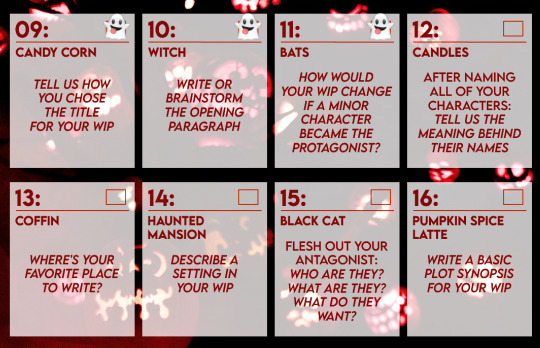
Find week 1 here!

🍭Candy Corn. Tell us how you chose the title of you wip.
I really wanted to play with the fact MC is blind and the mystical/magical/natural setting. I ended up with The trees don't let you see the forest, an idiom that means we focus so much on little problems we don't see the bigger picture. It really fits.
🧙♀️Witch. Write or brainstorm the opening paragraph.
When I wake up, there is nothing. There is the soft bubbling of a pot nearby, and the faint incense scent of Mauve's herbs whimsically floating in between the wooden walls of her cottage. I'm wrapped in clean sheets and have a wet towel on my forehead; bitter echoes of medicine still linger on my tongue. There are many things surrounding me, enough to recognize I'm lying in Mauve's bed, basking under the warmth of the sun rays coming through the open bay window; and that I'm not alone, judging by those ethereal footsteps over creaking wood, jumping on my lap. But when I slowly stretch and sit up to pet Periwinkle, I freeze. Because there is nothing. My eyes see as much as my left elbow.
🦇Bats. How would your WIP change if a minor character became the protagonist.
Let's choose Nutmeg, the little fae familiar. They are there for the ride, so if the story was written from their perspective, they would be following the group around, helping June cast spells and communicate with other fae creatures. The story would be lighthearted, childlike, hopeful, kind of oblivious, but full of love and support.
Their struggle would be communication because as a fae creature, they can understand human language but not produce it. They would feel very lonely at the start, but through physical affection and the way June now understands their struggles, they will learn to be happy like that.
Thank you 💜
#wtwevent#wtwcommunity#writeblr#creative writing#preptober#national novel writing month#nanowrimo#wip excerpt#witchcore#ghost gala#halley june#wip#wip: june
2 notes
·
View notes
Note
15 for the book asks pls (u can review/rec however many u feel like!!) I've missed all the times you've talked about what you're reading and I'm curious -chinhands-
GASP!!! YOU WANT ME TO REVIEW AND REC BOOKS??? delightful <3 <3 <3
15. recommend and review a book
The Lies of Locke Lamora by Scott Lynch
Let's start with the book that highkey kicked me back into reading a few months ago. This fantasy book should be considered a classic even if it is certainly not for everyone: Locke Lamora is a cursing, sneaky bastard man, who truly is not as clever as he thinks he is. I love him. I love his best friend Jean. I love the city of Camorr which appears to be the Florida of this fantasy world. There are sharks. There are many interludes telling you the history of the gods, or why a game of handball ended with a 30 year old blood feud. Or why the prostitutes of Camorr are so frightening even the lord of the thieves wont mess with them.
No one is pretty and I didn't know I needed this in a book until I read the Gentlemen Bastards books.
There are some things it doesn't have: a lot of female characters (especially in the first book - but we do get super hot pirate queens in the second book so there is that) and a PG rating. There is cursing, blood, death, and a lot of foul language (also some torture).
The Spellslinger Saga by Sebastien de Castell
This YA fantasy series is a very fun read if you enjoy outcast stories about idiot boys and their amazing lesbian mentors. No, but for real, I loved much of the underlying world building in this series: the obvious narrative bias our main character embodies (and slowly learns to grow out off) because of his upbringing, the conceptualization of the Argosi lifestyle and the way they see the world, the absolute bonkers religious/magical conflict that everything is built on... it makes for a fun read. And Kellen is truly unlike many male protagonists in YA fantasy: after every skirmish or fight or disagreement, the first thing Kellen does is cry, because his emotions are just a bit too much. (i love him, your honor - i also love his absolutely amazing mentor Ferius who could top me any day)
Some other things to point out: the fifth book really takes a step back in quality but it is worth it for the sixth book (which is my absolute favorite), there is a storyline between an abuser and the abused kid and while I love the conclusion for much of this storyline the kid is an absolutely unreliable narrator and that can make it hard to read
Gallant by V.E. Schwab
While I still think V.E. Schwab writes her best works when she writes Fantasy alla Our Dark Duet and Shades of Magic, I did enjoy this little foray into gothic horror quite a bit. How much? It made me cry, and I think that is always a great sign. With a protagonist with a physical disability I was afraid the narrative would focus on her regaining her voice, but truly that was not the case - instead it was much more focused on the definition of home... and how inescapable fate is, and yet wholly dependent on our own choices.
It wasn't a perfect book - the middle dragged a bit - but I did greatly enjoy it and it reminded me a lot of Crimson Peak. It does very much feel like a gothic horror set in a bleak 1950s England and if that is your thing... congrats (also there is no romance in this book and that is a good thing in my book).
(ask me one of these book asks)
#ask game#book asks#gallant#the lies of locke lamora#spellslinger#thank you DOTTIE!! <3 <3 <3#there are a lot more books I read recently#but I am not sure if i would recommend them here#like... i did like the name of the wind#but i couldnt rec it
21 notes
·
View notes
Text
man i really did just realize (a lot after looking at @emmiewtf 's posts and @//animemindset on tik tok they are so cool) why the last episode really did overall feel so much more unsatisfactory and didnt have like. as much oomf as it could've. (tiny tl:dr at the end if you cant read through this all this do be long)
despite having some really cool ass scenes and little things and some cute ass renga stuff. it was so much more focused and around adam than usual? and being genuinely uncomfortable and still not really liking adam because he's still. super creepy. its really just kinda disappointing to see how focused it was on him and how he literally didn't get like any consequences for any of the shit he pulled? like cool clown man you like skateboarding again, are we like gonna acknowledge the constant assault of skaters you went against, one being reki why is obviously just a minor trying to have fun while you literally traumatized him? like so much of the shit that happened to reki. adam inadvertently or not caused that and the fear of him getting left behind by langa and stuff because of how adam skated with reki. like i don't know if this makes sense and im super happy reki is happy with skating again but that shit and trauma still happened and led reki to that downward spiral and i feel like we don't talk about that enough. and adam still like. never got any consequences for that. if not for weird ass behavior around people that are literally minors, especially knowing how adam acts and that adam had some sort of connection with miya who's like. hardly 13-14 or so. you had a fucked family life and childhood and it's understandable to change because of that but just because your past is shit doesnt mean you commit assault for fun and act like that to kids. and innocent people just watching like when he used bystanders when he raced. that wasn't fun that was just. concerning. and he got no punishments, he like, as i understand practically got away free
he genuinely is not a character i like. and many people probably feel the same. the last episode was more focused on him and redeeming him compared to others and it really just didn't feel right. more focus on the protagonists, reki and langa, ESPECIALLY reki just would've made it better i think? more about their relationship, cherry, joe, MIYA. miya like, got so pushed on the back burner in the more recent episodes? didn't even get an on screen apology or proper explanation of reki's situation and as someone who genuinely loves miya that was. pretty disappointing please give miya more appreciation. but despite that uh. reki and langa's relationship was like, practically used to give adam a reason to skate for fun again. which is. like alright i guess? i just really didnt like it. it was fucking amazing to see langa break out of 'the zone' type thing because of reki and him putting fun in his skateboard but the focus on teaching adam thats its fun. it makes sense, it was practically expected considering how focused the show is on skateboarding being fun but after all the stuff adam did it wasn't satisfying seeing him get away with everything and suddenly be sort of friends? like ok with the rest of the cast. (ALSO TADASHI WHY WERE YOU OK WITH THE DOG THING???? DUDE???????? his like. love for skating once again is back i guess? but bro that. alright if he's into that im not judgin)
episodes like episode 6, 10, and 11 were my favorites and that's solely based on it being more centric on the actual protagonists and the cast genuinely having fun. and adam getting what he deserves. or adam must not being there HEHAHAHEJHFV so. in episode 6 there was like no adam and it was just the main 6 having fun! it was a genuinely great episode to watch with the cutest moments, plus some good ass foreshadowing? okay just more subtle buildup of reki's insecurities with some really nice moments while also being funny and fun! and that was really nice to watch! i think episodes 10 and 11, moreso 10 are my favorites because they're reki-centric. episode 10, we got to see so many intense character moments, shadow literally getting fucking bonked by that dude with his manager (STILL SAD OVER HER GETTING WITH SOMEONE ELSE WHERE IS THE HIROMI APPRECIATION HE TOOK A BAT. LIKE MULTIPLE HITS TO THE HEAD FOR HER???), i think that was the episode with the matchablossom carry? MANAGER OKA MOMENTS WE LOVE TO SEE IT HELL YES GET IT MAN WE LOVE TO SEE THE SUPPORT AND ADVICE TO REKI. TADASHI TAKING REKI TO A LOVE HOTEL?? THAT WAS SO OUT OF NOWHERE BUT ACTUALLY SO FUNNY TO ME (kinda creepy when he asked have you never been here before like. tadashi he's like, 17, please) and HOO BOY. LIKE ALL OF THE REKI MOMENTS IN THE EPISODE. GETTING MORE INSIGHT IN REKIS PAST (WHO IS!!! THE GANG HE WAS WITH!!!!!!!) AND SEEING HIM SLOWLY START TO REGAIN HIS LOVE FOR SKATING AND APOLOGIZE TO LANGA???? LITERALLY THE WHOLE SCENE WHEN HE RECONNECTED WITH LANGA. NOW THAT WAS SATISFYING. SEEING THE WAY THAT REKI LIT UP AGAIN WHEN HE REALIZED SKATING WAS FUN. HIS CONFIDENCE COMING BACK. SKATING WITH LANGA BECAUSE SKATING IS PRACTICALLY LOVE AND THEIR LOVE LANGUAGE SO THAT WAS ENOUGH. THE WAY LANGA WAS FOCUSED ON REKI. HIS BOARD WAS BROKEN BUT HIS TOP PRIORITY ISN'T JUST SKATING, IT WAS REKI. IT WASN'T FUN WITHOUT REKI AND HE LOVES IT BECAUSE ITS WITH REKI. AND EPISODE TEN JUST REALLY SHOWED REKI AND LANGA'S RELATIONSHIP PERFECTLY AND THE MAKE UP WAS SO GENUINELY SATISFYING WITH THE CUTEST FUCKING MOMENTS. THAT COMBINED WITH HOW GOOD THE PROGRESSION OF REKI WAS THROUGHOUT THE EPISODE REALLY JUST MADE IT HIT TO ME. it actually focused on the protagonists. and it was. so good. i will give anything to feel the same way i did watching episode ten for the first time again. it was a rollercoaster in all the perfect ways and it was just so genuinely fun and satisfying. and episode 11? was the perfect continuation of that for me.
episode 11. was so good. as i've seen many people say, its like reki reclaiming his spot as the main character and one of the main protagonists. he took a chance on the rain, he went against adam again and this time showed he wasn't afraid. he was just having fun and he was overcoming adam because of it. it wasn't just the board he made. this was emphasis on reki's own skills and confidence and how it got him to, even with not actually winning the race, he fuckin won. he showed adam who the hell he was. he showed EVERYONE what he was capable of despite of how much everyone doubted him. and do you know what makes that doubt people had in him even better? okay that wasn't worded really well but the doubt people had in him made the payoff of his success even better. but its the way that langa didn't fucking doubt him for a moment. he had his FULL TRUST in reki the entire time even when pretty much everyone else wanted him to give up. expected him and wanted him to stand down against adam. but langa believed and trusted reki. and even when he didn't win his first thought was to check on him and protect him from adam. renga's relationship, platonic or not is just. so amazing. so fucking beautiful despite the ups and downs because of how much care. the amount of trust they have in eachother, how they just know and understand eachother. its fun and okay because its the two of them. and that showed throughout the episode and i loved that. BUT ENOUGH RENGA. THE FOCUS ON REKI IN THE EPISODE. i believe in reki supremacy and that he needs more appreciation as the main character, the protagonist, and hoo boy. eleven was THE most satisfying shit. ARE WE NOT GONNA TALK ABOUT REKI EFFECTIVELY, DESPITE TALENT, COPIED LANGA'S TRICK? HOW HE SORTA REVERSE LOVE HUGGED ADAM? HOW HE USED AND LEARNED THE THINGY MIYA TAUGHT HIM yes i forgot the name IN THE FIRST RACE WITH ADAM. HOW REKI IS SO GOOD AT LEARNING THAT SHIT JUST BECAUSE ITS FUN. HE JUST DID IT BECAUSE IT SEEMED MORE FUN AND THATS SO AMAZING. PLUS THE CONFIDENCE REKI HAS? THE RESILIENCE HE HOLDS? HOW HE KEPT STANDING UP? TAKING EVERY THROW SPIN AND PUNCH once again fuck adam thats just a kid having fun and you were punching him until he was bleeding. if he didn't pull away, adam had those spiky things on his elbows. he would've genuinely hurt reki AGAIN. PLUS HIM PULLING THE FULL SWING KISS ON REKI???????? WHAT THE FUCK MAN. LIKE THE WAY REKI EVADED IT WAS SO COOL GO OFF REKI BABY YOU'RE DOING AMAZING BUT ADAM WHAT THE FUCK. but on the note of reki being amazing again, this episode really did show that. it had so much focus on reki and showed how him being reki, his confidence, the skills he developed himself, his love for skating is what makes him amazing. him being reki. thats what made people like him. thats what gave him everyone's support. thats what made him practically win and show that he IS the main character. that was reki at his BEST. the satisfaction of proving everyone wrong. his found skating family being so hyped and proud of him. AND HOO. FUCKING, BOY, ANOTHER ONE OF THE BESTS PART OF ELEVEN WAS ADAM EATING SHIT. WHAT HE FUCKING DESERVED. the mentality of the s goers and fans is kinda dumb with them not really caring about reki until this and literally bashing him still sorta at the start of the race. then immediately clowning adam, but adam like actually deserves the clowning hah. bitch. the best part of episode 11 was not only reki, but how they treated adam. he was GETTING what he deserved. seeing adam on the ground and fallen. people booing him and focusing on reki being cool as shit instead of adam winning. that was so fucking satisfying. taking the 'king' away from his throne after all the fuckery he's done, him being shunned. now that was beautiful. that was what i liked and adored. 11 once again, reki-centric, and adam getting some punishment for his actions. that was amazing. that was what i liked. i watched sk8 for reki and seeing that made me scream in delight.
episodes 10 and 11 were just, yeah. the focus on the main characters and adam getting what he deserved. the renga relationship moments were just. something about them both was just perfect and i hope i conveyed that right. episode 12 just . didn't make me feel all that much. at least compared to those 2. and that's pretty much completely because of adam. and because after 10 and 11, 12 really was just. kinda underwhelming i guess? the adam-centricness of it. the use of langa's love for reki and skateboarding for adam's sake really was just kinda. eh. THE ENDING AND ACTUAL MOMENTS THAT HIGHLIGHTED REKI AND LANGA WERE BEAUTIFUL AS ALWAYS but the adamness was just. yeah. it was. mm. all of my rant juice is like running out ive been typing this for like an hour so
TL;DR: the focus on and redemption of adam and not our mains was what made 12 so eh. the characters and their relationships is what makes sk8 so good and the sudden focus on adam was just. mm if you read all of that i hope that made sense and please feel to add on and respond!! i love seeing people's insight on things and i tend to forget about stuff when i rant!
#ein screams#like really scrwams#SCREAMS. HELP#ive though ab this so much ok#sk8 the infinity#sk8#sk8 spoilers#langa hasegawa#kyan reki#renga#sk8 the infinity spoilers#kaoru sakurayashiki#kojiro nanjo#hiromi higa#chinen miya#matcha blossom#shindo ainosuke#tadashi kikuchi#long post#adam hate club
70 notes
·
View notes
Text
Ichijouji Ken, his future, and Kizuna
Having talked about Kizuna’s extremely deep relationship to 02 as a series, it’s only natural that I should probably spend some extra focus on its main central character, Ichijouji Ken. It’s no secret that, although Daisuke was the protagonist of 02, Ken was the central figure to the series itself (after all, the series was founded on the concept of deconstructing the supposed “genius kid”), and so Kizuna having such a deep relationship with 02 means that it does, inevitably, have a deep relationship with Ken in particular.
The last twenty years have been full of a plethora of meta analysis on Ichijouji Ken as a character within 02 to the point I feel anything I could possibly come up with would probably be redundant, so today I’d like to place extra focus on his development after 02 (in terms of both canonical materials and general analysis), and how it leads up to his portrayal in the recently released Kizuna. (Naturally, spoilers for the movie will be below.)
We’ll start this analysis by looking at where Ken left off during the final episode of 02.
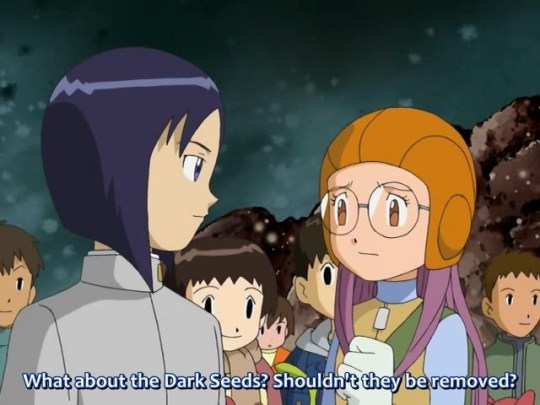
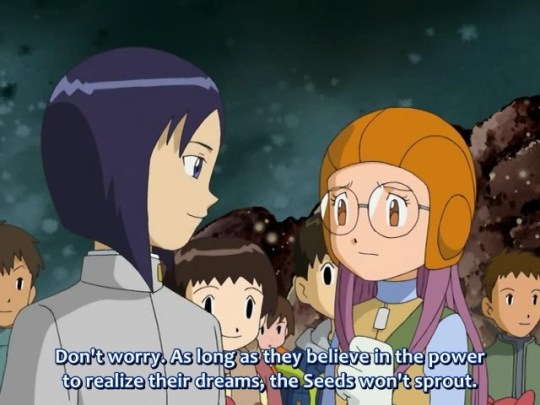
Thanks to his interactions with the rest of the 02 crew (especially Daisuke), Ken was slowly putting his life back together, but he still had a long way to go. As late as episode 49, we learned he still had suicidal ideation tendencies in regards to his deeds as the Kaiser, and although the rest of the team did get through to him in the end, it was clear that there was still a huge path ahead of him as far as coming to terms with himself and bonding with the rest of the team went. This was especially because he ended the series with the Dark Seed still in the back of his neck -- supernatural forces may have assisted his initial downfall, but it was going to be entirely on him to make sure that he never went back there again for the rest of his life.
One thing that’s really important to put in perspective is the actual chronology this ordeal took place in. Although the Kaiser saga spanned a little under half of the yearlong series that 02 was, Christmas skewed the schedule a little bit, so a good chunk of the second half of the series actually took place in much more condensed time than the first. Taking into account the official statement that everything before Christmas roughly aligns with the time of the year the relevant episode aired, and given the exact dates in December that we know episodes 38-50 take place in, within the course of 02, Ken’s reformation from being the Kaiser and bonding with the group spanned around only four months. That is not a lot of time, especially compared to the roughly two-year period Ken went through the trauma of his brother’s loss and his transformation into the Kaiser, so in actuality, Ken made a huge amount of progress considering how little time he had to do so.
Before we continue, I should make clear that I generally count pretty much everything in the Toei-esque fashion of “everything is canon, don’t think about contradictions too hard” (which is generally their modus operandi with pretty much any franchise), so pretty much everything here is fair game. That said, obviously, contradictions and other outliers do exist, so occasionally I am going to have to omit stuff that really, really doesn’t track...so for the sake of this analysis, I’m skipping Armor Evolution to the Unknown for two reasons: one, because it takes massive liberties with characterization for the sake of crack (it’s pretty hard to believe Ken would be this degree of flippant about the Kaiser persona in a more serious situation), and two, because it was written before 02 finished airing (it was released between episodes 43 and 44) and doesn’t reflect a lot of series and characterization development that happened later in the series. (Armor Evolution to the Unknown was released during a time period when the drama CDs were really, really big on the crack -- the three Adventure mini dramas are the same -- and it wasn’t until later that actual “serious” ones would start coming out.)
Given that, our next canonical point we can work with is Diablomon Strikes Back, which takes place in March 2003.

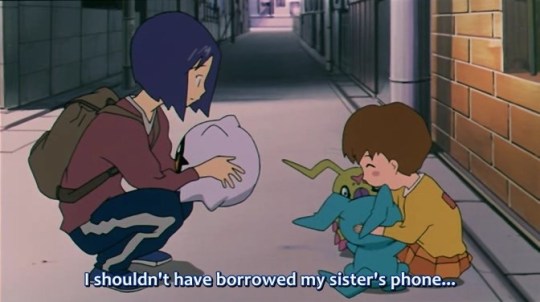
At this point Ken’s recovery is at a little around six months, and he’s making massive progress -- even if you’re not sure about counting the actual events of this movie as canon, it’s an excellent character study in terms of watching Ken’s emotional recovery at this point in time and his relationship with Daisuke, now that he’s not directly dealing with issues pertaining to his own past trauma.
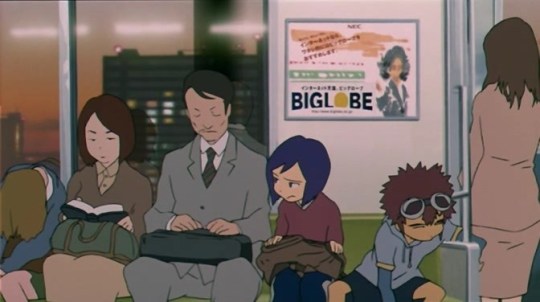
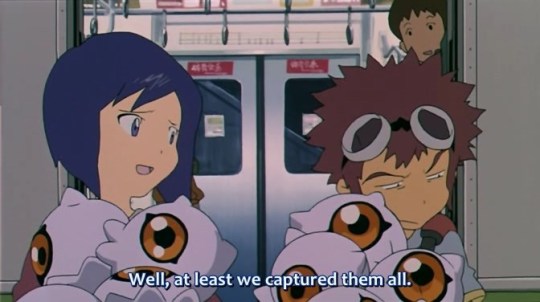
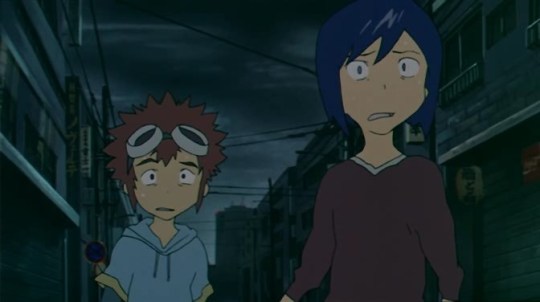
It’s already a very different Ken from the one we’ve seen in the original series, where in episode 38 the idea of him laughing was such a huge shock, but here we already see a much wider emotional range from Ken -- light cheerfulness, playfulness, and at times even a bit of petulance. His actions and dialogue still have Ken’s trademark “softness” -- being kind and gentle has always been said to be his core inner trait, after all -- but, nevertheless, he’s a lot more willing to show “superficial” emotions, especially compared to how closed up, shy, and sometimes standoffish he would be within 02 proper.
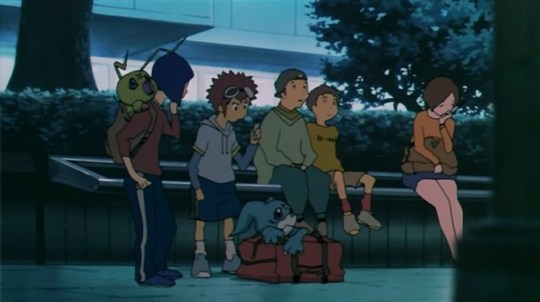
Even Ken’s own body language indicates a lot -- he’s much more relaxed and natural. Observe how he slouches here.
In fact, if you listen to Park Romi’s delivery of his lines throughout this movie, she voices him with a significantly higher-pitched and “lighter”, soft tone through all of it, which really gives off the impression that he’s much less emotionally uptight.
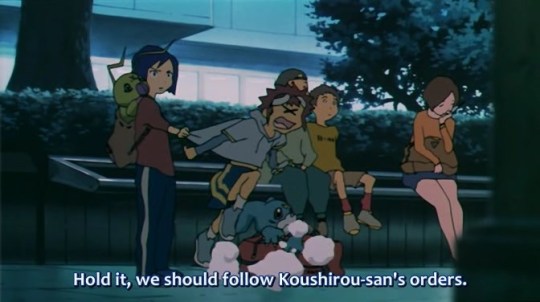
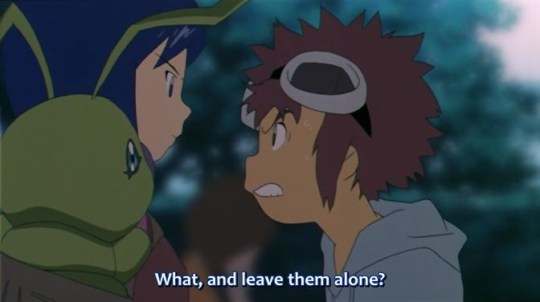
We get a glimpse of Daisuke and Ken’s future dynamic and how they’ll continue to be such tight friends in the future -- Ken is someone who can keep the infamously chaotic Daisuke in check (especially since prior to Ken coming into his life, Daisuke’s closest friend was probably Miyako, and while the two certainly got along very well with each other, they had a tendency to enable each other’s chaos a bit too much at times).
But despite Ken obviously trying to be more sensible than Daisuke here, it still manifests as a much greater show of emotion than the kind you’d be used to within 02 proper. He’s much more assertive with putting his foot down in keeping Daisuke under control, which indicates not only a more comfortable relationship with Daisuke in particular, but also a general increase in his ability to be assertive.
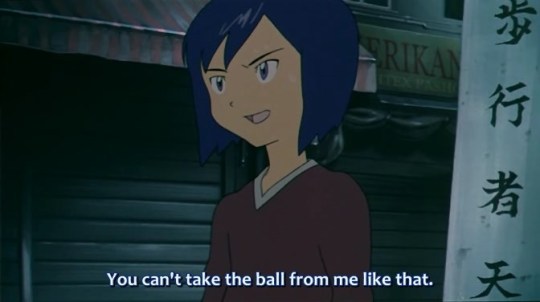
In one of his most famous scenes in this movie, he actually outright taunts Daisuke in order to spur him on. He’s doing it totally affectionately (it’s specifically to give Daisuke more motivation to keep running), but nevertheless, he’s taunting Daisuke -- not really something you'd expect from Ken in 02 proper. The original line in Japanese even has him use the very super-casual and aggressive end particle ~ze.
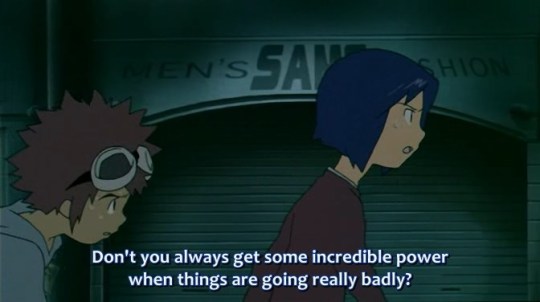
He even snarks about Daisuke’s convenient bouts of luck in ways that aren’t exactly complimentary (the literal phrasing of this line has “baka mitai ni” in it, in this context "some kind of ridiculous incredible power”).
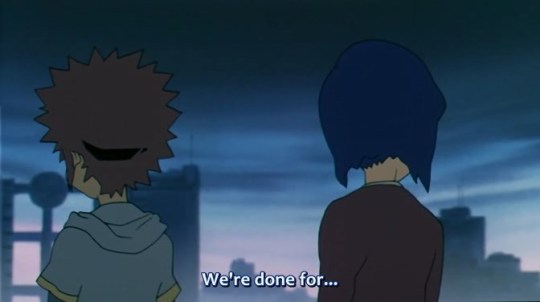
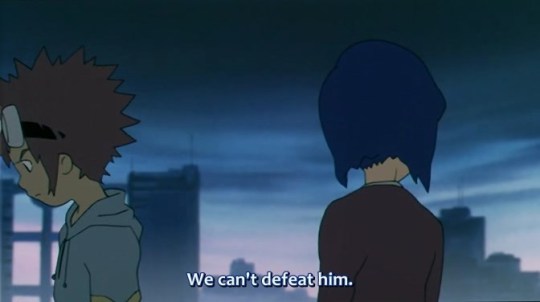
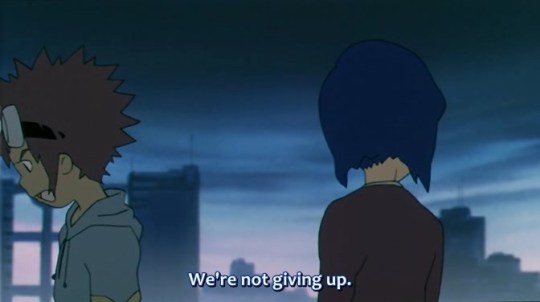
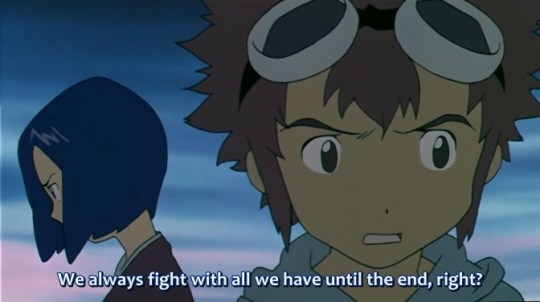
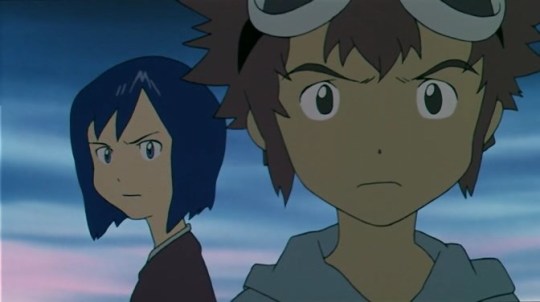
And, near the end of the movie, when he starts to lose hope, it only takes a single line from Daisuke to get himself back together -- this kind of thing would have probably taken a whole speech in 02, even from Daisuke himself, but by this point Ken’s got a much better emotional grasp on himself.
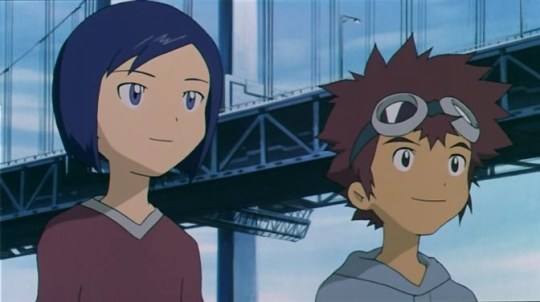
And in the end, the movie ends on both Daisuke and Ken laughing together -- very lightly.
It’s easy to pass off Ken’s characterization in DSB as an incidental thing simply because this is a “side story” movie from 02 -- especially since it was technically produced during 02′s airing -- but in fact, this portrayal is consistent with what Ken has to say about himself during his next known point in canon, Spring 2003.
Given that Takeru’s track is apparently set “three months” after Christmas, and Miyako’s track talks about having just entered middle school, I assume that this means Ken’s takes place in around late March or early April 2003 (almost exactly a year since 02′s start), but in actuality nothing really “happens” during Ken’s track. Nevertheless, it provides a lot of information on Ken’s state of mind during this time and his own self-reflection on his past...and defines in very clear words what it is that Ken needs to move away from.
You were always in a bad mood and you were cold to me, but now that I think about it, maybe you really wanted to be nicer to other people. I don’t know what happened to you that made you act like you did, but now, I finally feel like I understand a bit.
You were demanded to grow up fast, weren’t you, Brother?
Because we were always being evaluated and compared by someone, we didn’t get a chance to have more freedom. We didn’t have any chances to run down an alley because we felt like it, or pull up weeds, or tumble around… meaningless things, things that didn’t bring any value to us at all.
Just like the cat napping on the roof… we weren’t able to fully enjoy any everlasting freedom.
02 -- especially its latter half -- dealt largely with the concept of parents imposing too many expectations on their children, acting “proud” of them but actually using them to inflate their own self-worth, and in the end effectively robbing their own children of their right to “be children”. While we don’t know a lot about Osamu based on limited information about him, Ken’s parents also lament that they might have robbed Osamu of the opportunity to be a “normal boy” in 02 episode 23.
Once Ken took the role of the “family genius” after Osamu’s death, Ken was thus likewise robbed of that “normal childhood” due to all of the expectations put on him -- and Ken’s words in his track imply that it extended to before Osamu’s death, because just because Osamu was the favored one at the time didn’t mean that Ken wasn’t subject to the same kind of expectations to at least some degree, even if not as much. (Note how he really didn’t seem to have any kind of friends at all prior to Daisuke and the others.)
Thus, Ken’s ideal trajectory is to become “a normal child” -- one not subject to expectations as a “well-behaved genius child”. That applies not only to things like his academic or sports performance, but also even his core manners -- being a “normal person” in this context meaning being allowed to show emotions, be petty, have emotional range that extends beyond just being deferential and polite, and generally do things because he enjoys them and not because others expect him to. This is consistent with his portrayal in DSB, as in said movie he really does come off as a “normal boy” -- a young child who, while certainly less chaotic than Daisuke, is still enjoying himself and interacting with the world in “his own” natural, relaxed way rather than holding himself to obligations.
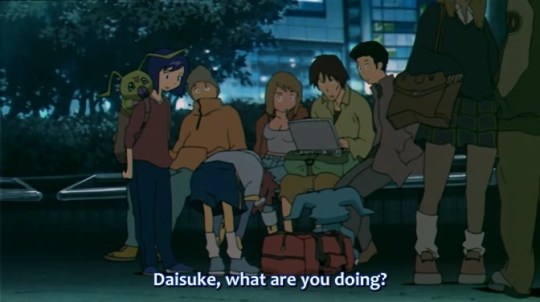
Another interesting thing about DSB is that it has Ken refer to Daisuke by given name. This is particularly intriguing because up until the end of 02, Ken consistently referred to Daisuke as “Motomiya” (he did use given name in episode 39, but it wasn’t something he really followed up on). This despite the fact he went with given names (plus honorifics) for everyone else in the 02 team, but it seems like Ken was still trying to figure out his very complicated feelings about Daisuke as someone who was his Most Hated Person™ during his Kaiser days and yet is now trying to aggressively reach through his barriers that he’s constructed out of self-defense.
And yet, extremely notably, almost every single post-02 material is consistent about the idea that Ken switches to given name basis with Daisuke after 02. (The only exception is Armor Evolution to the Unknown, which, as stated before, was written and recorded during 02′s airing and not after; notably, Daisuke is also on surname basis with Ken during that drama CD, even though he permanently switches to given name basis after episode 39.) That includes “out-of-hard-canon” things like Xros Wars episode 78.
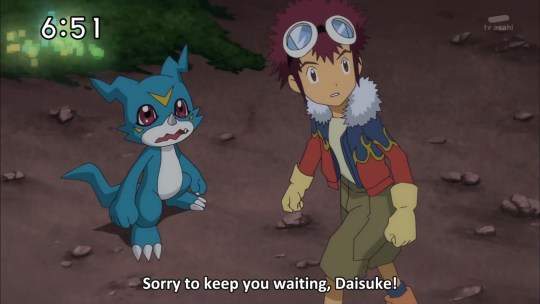
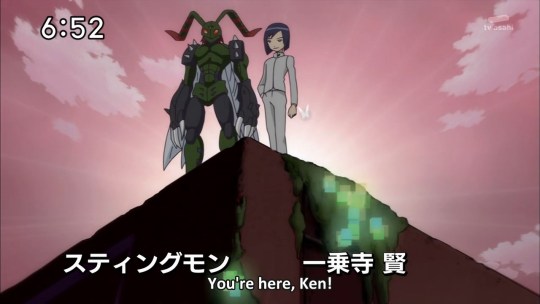
Yet they still couldn’t remember to put the highlight back in Ken’s eyes, among other things.
Honorific and surname-given name basis fluctuated quite a bit in both Adventure and 02 (especially whenever canon material changed hands between writers), but for all intents and purposes, there is no reason Daisuke and Ken should not be on mutual given name basis after 02. This is especially when you take into account the more naturalistic relationship they have as of DSB -- there’s no standoffishness at all between them anymore.
This ties very deeply into how 02 portrayed its characters. One thing I’ve very, very often pointed out was that it was always an explicit point of contrast between themselves and the original Adventure team was that the 02 kids were not only “friends” in terms of fighting together on Digimon cases, but “friends” in the sense of actual social-life friends who clicked well in personality and adored each other’s company. (Part of this was because of the core theme of the series; Jogress being such a huge motif, “understanding your friends” took precedence over Adventure’s “understanding yourself”.) These are the kids who hung out together in the totally-not-related-to-any-Digimon-incident (at least, not at first) picnic in episode 6 and Christmas party in episode 38, a stark comparison to the Adventure kids who infamously started drifting as early as Our War Game!.
(Note that this isn’t meant to diminish or drop shade on the Adventure kids’ bonds in any way -- I feel like their bond is more of one that’s a “transcendent” one that crosses space and links them through their shared experience, but, nevertheless, is simply not the same in nature as the “social life” bonds the 02 kids had where they were very casual and yet intimate with each other in almost all daily life respects.)
As a result, Daisuke and Ken’s relationship ended up very different from that of their predecessors Taichi and Yamato -- it’s actually hard to imagine them getting in all that many highly heated fights in the same way their seniors would be prone to, and they’d generally be on “mild banter” terms for most of it. In fact, they come off as pretty casual and in-sync with each other, and it’s to the point where it really does feel like -- especially by the point of DSB -- staying on “standoffish” surname basis really is unwarranted.
And while it’s tempting to limit Ken’s relationship to only Daisuke, this did involve the rest of the 02 group, after all -- we got significant episodes defining his relationship to the others (Miyako got a whole episode in 25, and 30′s entire events kicked off because of an attempt to get him to better socialize with Iori!), and the 02 kids as a cohesive “overall group” were integral in getting Ken to open up and show different sides of himself. Although his relationship to certain team members ended up closer than others (Daisuke and Miyako, the ones who tried most aggressively to reach out to him, ended up getting the most out of him), nevertheless, it was important that Ken ultimately cultivated a relationship with a group of friends, and not just one.
This, of course, brings us to Kizuna, which takes place in the summer of 2010. This is a massive leap of time we don’t know a lot about, and for all it’s worth, this means we have, compared to the approximately two years Ken spent suffering under the influence of the Dark Seed, a whole eight years dedicated to potential recovery. There’s a lot that could have happened during that time, and what happened in between, we can only really guess.

Well, for one, he cut his hair.
The reveal of Ken’s design for Kizuna was a huge shock for those watching, because, among all of the twelve main human characters in Kizuna, he probably has the biggest and most drastic design change -- especially because his long hair was so iconic that even the epilogue depicted him with it (and even longer, at that). Were it not for other important identifiers like Wormmon’s presence and the fact said hair is at least still indigo blue, you’d almost wonder if it’s the same character.
(I do have to at least give props to this Animedia poster, though -- that soft and concerned expression is textbook Ken-chan, so it absolutely nails the vibe that it’s the same character despite the massive design change, and it even has a small cute detail that, despite clearly trying to calm Yamato down in haste, he’s still tidy enough to lay his chopsticks neatly on the bowl. That Ken has a habit of doing this while eating hot ramen is a very specific minor blink-and-you’ll-miss-it detail in 02 episode 36, and while I’d normally pass this off as coincidence, Kizuna and its PR has had such ridiculous attention to detail that I’m not entirely willing to.)
Not only that, his actual outfit in the movie is rather unassuming -- it’s just a black shirt, pants, and a belt, compared to the more distinctive/fashionable or setting-immersive outfits everyone else has. I mean, it sure beats that godawful grey gakuran he was constantly wearing during 02, but there were certainly a lot of complaints about how...well, unassuming and plain he looks.
The thing is, though, this is very much in line with how Ken would most likely want to present himself. When you think about it, Ken himself would probably not really appreciate his fanbase status as the “sad pretty boy”; having been scrutinized, evaluated, and put on uncomfortable pedestals through all of his early life, “blending in” and coming off as an average, unassuming person would be right up his alley.
Anyway, before we get into Kizuna itself, we have the drama CD that came with its BD, Where Should We Go? While it was released after the movie, in chronological timeline, it serves as a slight prequel, and what we learn about Ken in it is certainly...interesting. Namely, that he’s apparently a hardcore fan of Japanese hot springs. And not just a hardcore fan of them, but also a complete nerd.
The hot springs *obviously* must have free-flowing water. If possible, I think I’d prefer a quiet, rural flowing hot spring that’s surrounded by a moss-covered garden. Then I want to stay the night at a historical inn that focuses more on tranquility and wabi-sabi rather than wildness or beauty. I’m not looking for a lot on the food options, but the portions should ideally be neither too large nor too small. If we’re just going to relax our bodies, then I’d like it if there was a variety of hot springs to choose from. The water quality that I recommend for the ladies would be the hydrogen carbonate spring or the alkaline simple hot spring (these are otherwise known as simple hot springs with a basic pH of 8.5 or above), but my personal favorite is the hot sulphur spring! Incidentally, the hot sulphur spring is said to treat arteriosclerosis and high blood pressure. If it were possible, I’d like to take my time there… At least stay for two nights! Ahh… Hot springs… Hehehe…
I cannot stress enough how much the audio delivery for this depicts him as being terrifyingly into it. It’s also...not exactly the most fashionable thing for a nineteen-year-old to be into (actually, it’s more of a stereotype old man thing, what with the fixation on traditional Japanese aesthetics and health nut aspects), but we have Ken being very shameless and assertive about his personal interests, even if they’re a bit unusual.
Funnily enough, this isn’t actually the first time he was demonstrated to be a huge infodumping nerd -- it’s just that the last instance was questionably canonical, but tracks extremely heavily with what was just demonstrated here. Namely, Daisuke and Ken’s Shopping Carol:
Listen, the thing about Christmas is that it's one of the most important days in the world...
It was the day the Savior was born...
So, you go to church and pray...
Of course, you knew all of that right?
Or in other words, he interrupts Daisuke’s wistful thoughts with The Actual Nerd Facts, because he’s a nerd. He even has a bit of a smart-aleck atmosphere...and then he cheerfully and sassily dumps all of the work on Daisuke thereafter. While the canonicity for this song is hard to place since it was released during 02′s airing (and 02 itself depicted a very different Christmas), plus the ambiguity of character song canon in general, it’s interesting how Ken’s portrayal here is pretty surprisingly in line with what we’re learning about his future personality.
The rest of what we see of Ken in the drama CD is what we generally knew about him already -- he’s kind, he dotes on Wormmon (he even indulges Wormmon’s request to take him skiing!), and he still keeps up with being into intellectual studies, and even soccer (he’s described as actually keeping up with soccer to the extent he does training camp), because he was always interested in those kinds of things -- it’s just that now he can indulge in them in ways he personally likes instead of being held to other people’s standards.
But he’s also very emotional, passionate, and openly assertive -- something he could be in 02, but only when it was something he really, really cared about, because most of the time he was a little more on the shy side with others. Not anymore. And he’s happy to indulge in the chaotic trip planning and enable the others, and, at the end, gives some sentimental words to Daisuke, his best friend.
Anyway, onto the movie itself!
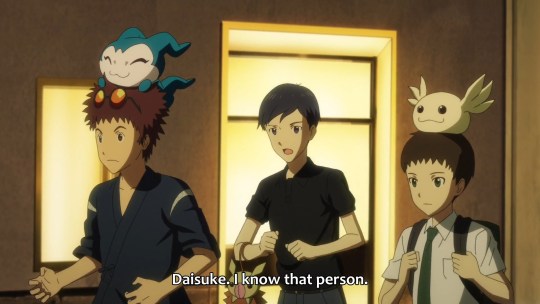
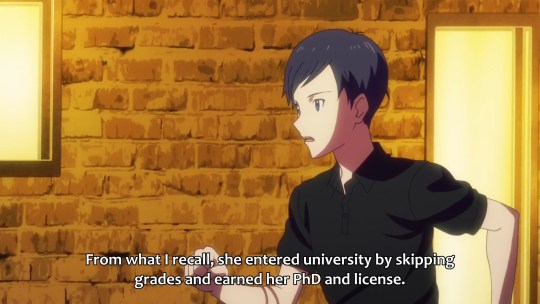
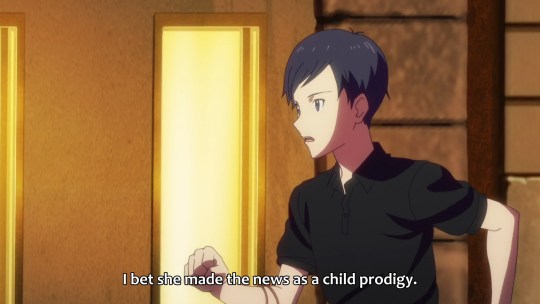
Notably, they do not mention Ken’s past trauma nor his deeds as the Kaiser throughout the entire movie.
That might surprise people, given that this was...well, central to the entire plot of 02, so it’s arguably a glaring omission that despite having the 02 cast here, it’s not even brought up once. The only real “reference” to it is this scene, where Ken happens to be the one who knows about Menoa’s background as a child prodigy -- and even then it’s uncertain whether this had anything to do with said traumatic events (Menoa was admitted to Liberica in 2002 itself) as much as it’s a meta nod to Ken having a suspiciously similar background and the fact he and Menoa were based on the same real-life story (the nine-year-old boy who skipped grades into Columbia University).
But, again, recall that Ken has had eight years to move on from the events of 02, more time than said events had actually spanned over. That doesn’t mean he’s easily going to forget that trauma, nor that said events don’t still have an impact on him, but rather that a true positive development for him should have him not having to consciously dwell on it if it’s not necessary, and that his friends of now eight years should probably not be still holding it over him at a time like this.
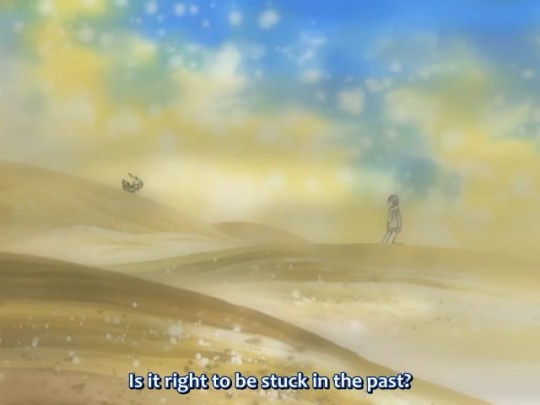
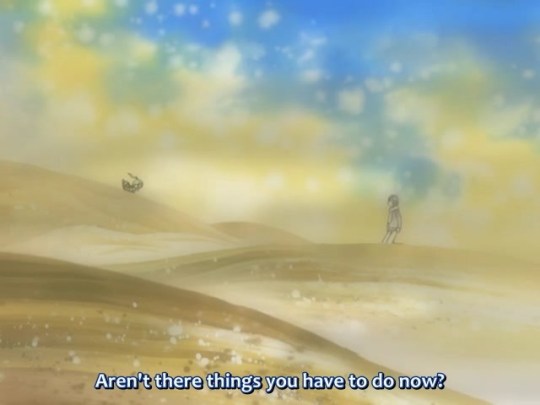
After all, 02 itself was dedicated to scolding this kind of behavior -- not being “stuck in the past” (which, well, also happens to be a very pertinent theme when it comes to Kizuna...) was basically the entire point of the latter half, and so it stands to reason that Ken, and by extension the rest of the 02 cast, would be more focused on what they’re doing now instead of what happened back then.
In the absence of any references to said past, Ken in the actual movie ends up coming off as a bit unremarkable and plain compared to the three friends who end up surrounding him, all of whom have much more extreme personalities (the chaotic and exuberant Daisuke and Miyako, and the comically poker-faced Iori). But you get the feeling that he’s perfectly fine being that way -- rather, he’s enjoying getting all of his fun from his exciting friends, without feeling a need to spice things up himself.

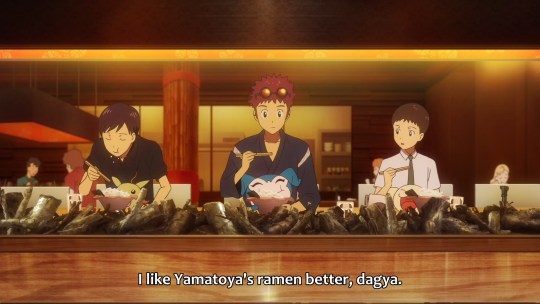
So when we finally do meet Ken for the first time in Kizuna, he’s cheerfully eating ramen with Daisuke and Iori in New York (which, for all it’s worth, is probably really questionably legal, considering that Adventure’s world of 2010 likely still hasn’t figured out how to deal with that whole thing with “immigration and customs” as it pertains to Digital Gates.) Emphasis on cheerfully. He’s as tidy as ever (note how he still properly keeps his chopsticks between his fingers and cleans up after himself, albeit not as well as Iori), and he’s obviously more straight-laced than Daisuke or Miyako, but he isn’t really hiding the fact he’s also totally enjoying this. He didn’t even know why they were there for ramen in New York in the first place, but he just rolled with wherever Daisuke took him.
Recall that, according to their official profiles, these three go to completely different schools now -- Iori’s in high school, Daisuke’s at vocational school getting a chef’s license, and Ken’s in university studying psychology. (Which, by the way, is not brought up at all throughout the movie nor the drama CD! It’s easy to glean how his past experiences might give him an interest in the topic, and it’ll certainly be a valuable background to have for his future known career in criminal investigation, but despite Ken previously having had a reputation for being studious, it’s not brought up at all -- almost as if hanging out with his friends and having fun with them is more important and pertinent.) The drama CD even points out that Ken would normally be busy with soccer training camp. Yet they’re hanging out. In New York. Eating ramen. So, Yamato, what were you saying about how “choosing your own path can sometimes mean being alienated from friends”? If anything, these friends seem to be going out of their way to make sure they’re staying tight.
And, as you’d expect, Ken refers to Daisuke by given name, following DSB’s precedent. Again, given the nature of their relationship right now, this should be expected. There’s other evidence that Kizuna does use DSB as reference in certain other respects as well (Takeru calls Yamato “niisan”, which had previously been exclusive to that movie), and it’s very possible that Ken as portrayed in that movie was used as reference for his potential trajectory here.
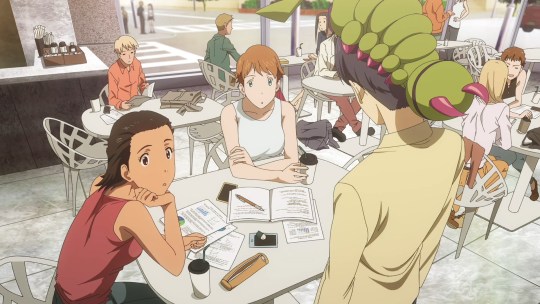
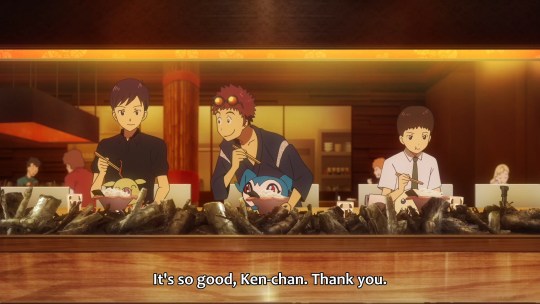
Note that he seems to be even more outwardly affectionate with Wormmon than before (which is, shockingly, apparently possible) -- he still feeds his partner before feeding himself (similar to what he did in 02 episode 37), but now he also shamelessly carries Wormmon on his head, which he never did in 02. Perhaps it’s because he’s tall enough to carry the weight, but unlike with Takeru and Patamon, Wormmon is big enough that the sight is honestly comical -- yet Ken couldn’t care less, and while we don’t see him in his own school, it’s a sharp contrast to how Taichi and Yamato scoffed at the idea of bringing their partners to school because they “have their own lives to live”.
(A nice touch is Ken carrying Minomon from his arm, which actually comes from a very obscure piece of 02 concept art -- you can find it in the Character Complete File or the Animation Chronicle -- but was never depicted in the series proper. The Kizuna design works in the April 2020 edition of Animedia actually recreated that piece of art with Ken in the exact same position, only as a nineteen-year-old this time, which was an incredibly welcome thing to see.)
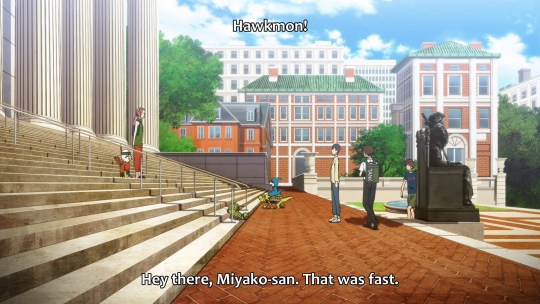
He greets Miyako upfront when she arrives, which doesn’t look like much on its face, but recall that this probably wouldn’t have happened during 02 proper -- not even with Daisuke! -- and, at the very least, not with this very casual “hey!” tone. It means a lot in terms of how much more casual of a person he’s been able to become in the last eight years, and how much more casual he is with this group (well, at least with Miyako). Takeru also greets Wormmon in the drama CD, and Wormmon seems pretty unusually happy to see Hawkmon when they meet each other there, certainly implying a lot of interpersonal interaction since.
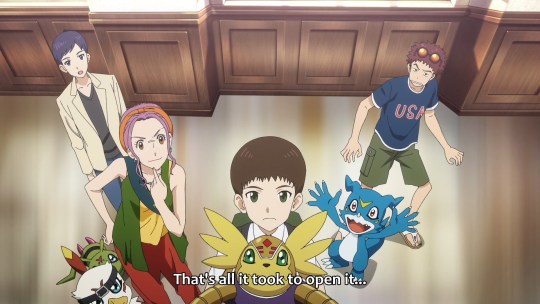
Miyako meets up with them (and, going back to how tight these kids are, Miyako would come in all the way from Spain to meet her friends even for the exact same job that she dumped on her seniors), and they end up infiltrating Menoa’s office. He gets in a line of snark, especially because the Shueisha Mirai novel indicates he’s deliberately “looking the other way” in regards to worrying about security -- looks like he’s developing some Lawful tendencies, but in the end, his friends and getting to the bottom of the real truth take priority.
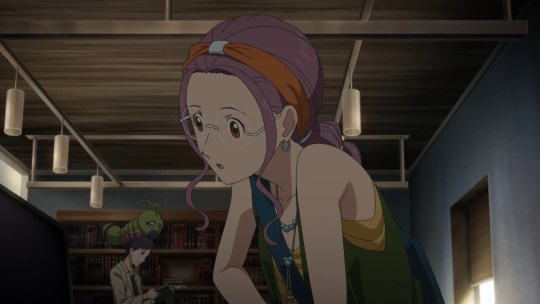
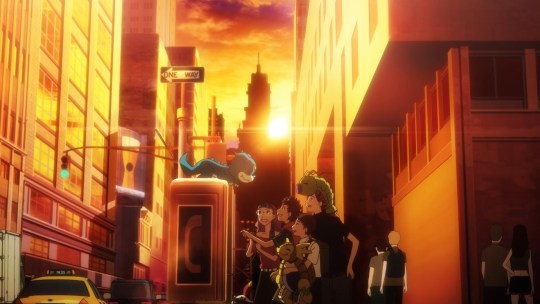
And, also, it’s still pretty clear he’s totally taking the opportunity to enjoy this.
So what does this all mean, really? He’s taking a fairly passive attitude with his abundantly more chaotic friends, but he’s also not protesting, and he’s enjoying everything he can out of it. He’s a bit quieter than he was in DSB, but that could easily just be from being older and a bit more mature, and he hardly comes off as reserved, either (it helps that Daisuke doesn’t quite resort to any antics nearly as ridiculous as he did in DSB, so there’s no need to keep him in check -- yep, even Daisuke got a bit more mature himself). And he’s joining these kids in being possibly some of the most chaotic disaster adults (near-adults?) on this planet, in a sharp contrast to their seniors.
I mentioned earlier in my analysis of Kizuna’s relationship to 02 that Ken is actually a “hidden” foil to Kizuna’s main antagonist, Menoa -- they were both conceived from the same idea Producer Seki had regarding the real-life “genius boy” who ended up going to Columbia University at a young age and, in her opinion, was going to be robbed of a proper childhood experience. 02′s Dark Seed children arc was a major indictment against parents forcing this kind of pressure on children, not only in the sense of pushing them academically but also quashing out their more “childish” dreams for the sake of a more “dignified” outlook and future. Through the events of 02, Ken learned a very personal lesson on not losing his “true self” to the pressure of those expectations, and the meaning of valuing his family and friends instead.
Ken and Menoa, effectively, were originally on the same path, but thanks to the circumstances of 02, Ken managed to avert Menoa’s fate and ended up following his own way. Nevertheless, Ken was largely robbed of a normal kid’s childhood up until the age of eleven, and it stands to reason that, even at the age of nineteen, he might still be trying to make up for all of those fun experiences he never was able to have.
Funny thing about his haircut, too -- this isn’t the first time Ken’s had this haircut, actually. You know when was the last known time he did?
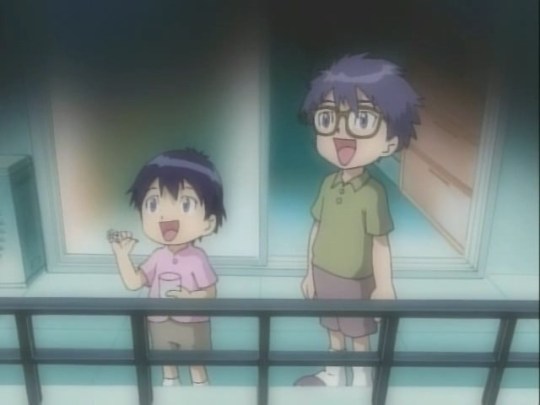
Hm. Coincidence? Maybe. Maybe not.
But unlike Menoa, who decided that it would be better to trap herself in her own distorted view of what “childhood” is, or Oikawa, who ended up clinging dearly to the last reminder he had of what he’d lost from his childhood, Ken ends up dealing with it in a very forward-facing manner. In fact, he’d elucidated his feelings on the issue back in Spring 2003:
There are still a lot of times when I think about how I should have “done this back then.” But I discovered that there are many things I can do over afterwards.
I’ll stop counting the things that I can’t do. Because I’m sure there are many things that I can do.
Instead of living in regrets about the past, Ken simply chooses to move forward by making new fun experiences and memories with his friends, befitting those he couldn’t have when he was a kid, and perhaps even enhanced by his newfound freedom as a nineteen-year-old.
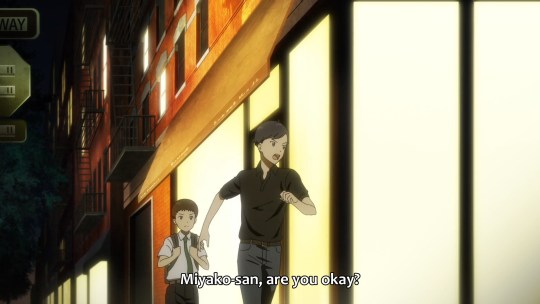
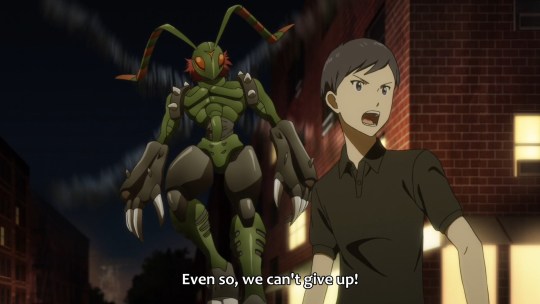
During the final battle, we get a few more emotional and assertive shows from Ken -- his concern about Miyako is pretty frantic-sounding, and the fact he steps in so quickly and frantically to help her out by his own will is pretty impressive. And then he definitively declares that they can’t afford to give up -- which is certainly in line with the nobility he had even during 02, but remember when, even in DSB, Daisuke had to be the one to remind him of this? Now he’s the one reassuring his teammates about this, all on his own. When it all comes down to it, his sense of awareness of what he wants and what he wants to do is stronger than ever.
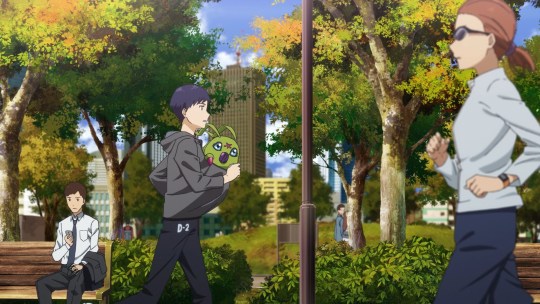

I mentioned in my analysis of Kizuna in relation to 02 that the 02 kids are in a fairly unique position in the movie, thanks to having already practically gone through a lot of the lessons in both 02 and Kizuna, thus leading them to become very lacking in susceptibility to potentially losing their partners anytime soon (and in fact are deliberately portrayed as such). I would say of all of them, Ken is the most representative of this -- being such a direct foil to the movie’s main antagonist, one who actually came dangerously close to making some of the exact same mistakes she did and emerged with his own trauma as a result, the lessons and warnings imparted by the movie are already deeply embedded in his being.
He’s one of the most openly affectionate and intimate with his partner, having already learned the very, very hard way of what happens when you don’t treasure your partner properly. (He’s taking Wormmon jogging with him, which has got to be an awfully uncomfortable setup, but, goddammit, he’s gonna make it work. And if ~With~ is to be believed, he’s been doing this for years now.) He’s still got a Dark Seed in the back of his neck as an eternal reminder to remember who he is, and to acknowledge the love from his family and friends around him instead of succumbing to arbitrary societal expectations. Remember what I said in my earlier analysis about the true reason for partnerships dissolving, and how deeply it was tied to throwing yourself away for the sake of arbitrary standards of adulthood? Ken’s experiences and extremely painful trauma are like a giant do not do this stamp on his face, and although everyone in this cast is naturally human and may have ups and downs or relapses, Ken is possibly one of the last characters one could imagine succumbing to that kind of mistake again.
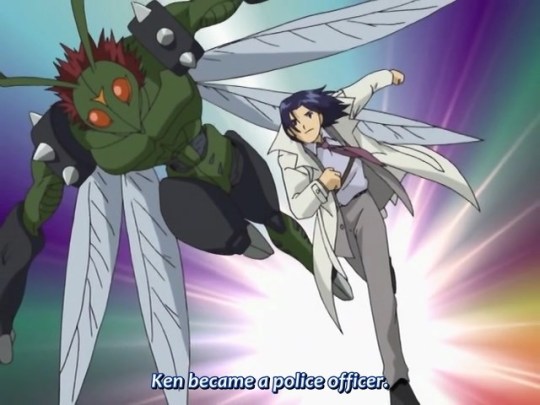
So we make it to the epilogue, and although Ken’s technical job title as given in the epilogue is literally “police officer” (keisatsukan), his form of dress (plainclothes, not uniform) and his the Character Complete File indicate he’s from the Digimon Special Investigations Unit (tokusoubu), or, in other words, he’s actually a public-servant detective. (So no, the various dubs also going with “detective” are thus not “changes” in this respect.) In short, he investigates scenes of crimes after they happen, and the Character Complete File provides an example in the form of him investigating a dead body found at the river.
This is probably why Kizuna has him major in psychology, because forensic psychology would be a pretty useful skillset for this kind of job, and a university education in general would most certainly be helpful. (The job requirements as per the Japanese system also require a very high level of athleticism and aptitude.) On the other hand, considering what we know about Ken up to Kizuna, there aren’t any indications that he treated this like any kind of major aspiration, and the psychology major makes you think he might have just fallen into this career by a series of accidents -- he took an interest in psychology (and mental health) due to his own experiences, and then decided that “discovering the truth behind things” was up his alley (much like Iori). Even more notably, his position isn’t really described in any history-making terms, not even ones like being “the first” of anything (like Jou), and it feels like he’s doing this to contribute to society in a way he prefers more than he’s trying to accomplish anything world-shattering.
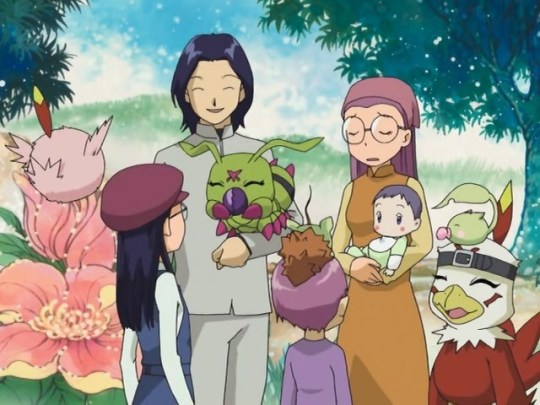
But on the flip side, it’s probably no coincidence that the 02 epilogue portrays him with such a big family. Of course, it also fits with his and Miyako’s family backgrounds (they’d probably want their kids to have siblings, given their own experiences), but since the Dark Seed was described as having its effects countered by acknowledging how much you’re loved, Ken is clearly surrounded by love -- his wife is one of the most openly affectionate people out there, and his kids (or at least his middle child) use the same “Mama” kind of affectionate language Ken shared with his own parents. Once the events of 02 came to a close at the end of 2002, Ken went on a journey of discovering his own self-assertion, personal desires, and fun -- shedding the expectations and societal standards others had of him, and learning to enjoy life in ways he personally enjoys, for his own sake.
#digimon#digimon adventure 02#digimon adventure last evolution kizuna#ken ichijouji#ichijouji ken#shihameta#kizuna spoilers
126 notes
·
View notes
Text
TerraMythos 2021 Reading Challenge - Book 19 of 26
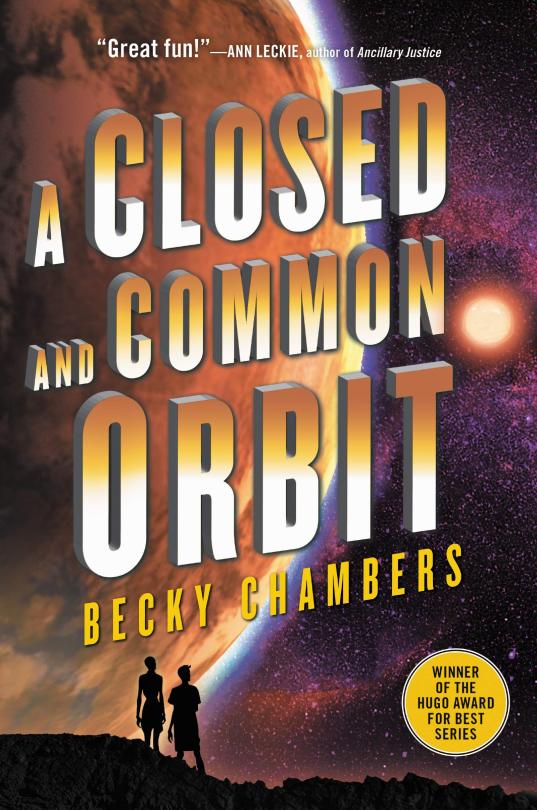
Title: A Closed and Common Orbit (Wayfarers #2) (2016)
Author: Becky Chambers
Genre/Tags: Science Fiction, Third-Person, Female Protagonists
Rating: 9/10
Date Began: 7/25/2021
Date Finished: 8/5/2021
“Lovelace” is an AI system aboard the Wayfarer, a wormhole tunneling ship. Following a critical error, she awakens as a fresh installation, overwriting the beloved version everyone knew and loved. Faced with a distraught crew, she accepts a strange offer: upload her consciousness to a humanlike “body kit” and live with an independent tech on Port Coriol. She renames herself Sidra and moves in with Pepper and her partner Blue. Despite their support, Sidra struggles to figure out who she really is, and the type of person she wants to be. To complicate matters, her existence as an AI in a body kit is strictly illegal… and discovery means certain death.
Pepper has her own shaky past. Once “Jane 23”, a genetically engineered slave from a fringe colony, she escapes from a scrap processing factory. Amid the continent-spanning junk heap, she discovers a trapped, functional AI named Owl. Owl saves her life and teaches her about the galaxy beyond. As Jane struggles to survive in a harsh and desolate wasteland, she resolves to fix Owl’s broken ship and escape the planet together. But such a feat is easier said than done.
“Just because someone goes away doesn’t mean you stop loving them.”
Content warnings and minor spoilers below the cut.
Content warnings for the book: Slavery, child abuse, child death, animal death. Depictions of PTSD/panic attacks. Traumatic injury and severe malnutrition. Recreational drug use.
I enjoyed A Closed and Common Orbit much more than The Long Way to a Small, Angry Planet. From what I understand, all the books in the Wayfarers series are standalones, but this one does have a direct connection to the previous story. It stars two minor characters from the last book— Pepper, a genetically engineered technician who escaped from slavery on a fringe colony, and Sidra (i.e. Lovelace), an AI installed in an illegal, humanlike body. While A Closed and Common Orbit can be read on its own, the last book is helpful for some context and worldbuilding.
Official descriptions for the book don’t do it justice. Common Orbit follows two narrative threads. There’s a “current” story that follows Sidra as she adjusts to her new body and learns how to be a person. This storyline doesn’t contain much action, but there is some tension with Sidra hiding her true identity. With Pepper and her partner Blue’s help, Sidra gradually accepts/overcomes her unique abilities, challenges, and limitations. Sidra’s story functions as a scifi flavored coming-of-age story. It’s not all fluffy and heartwarming, containing realistic interpersonal conflicts and a rocky friendship with an Aeluon tattoo artist named Tak (who is awesome—a genderfluid character whose pronouns change throughout the book, and no one sees it as weird or a big deal. Hell yeah). I like seeing fictional friendships that take work to develop, but become genuine as both characters grow.
But in my opinion, the meat of the narrative lies in the “past” thread, which serves as Pepper’s origin story. It details her childhood as a slave called “Jane 23”, her escape into a continent-sized scrapyard, and her chance meeting with Owl, an abandoned AI trapped in a junk ship. Owl takes on the role of a parent and does her best to raise Jane. This story is excellent for many reasons. It’s a parallel coming-of-age story. Like Sidra, Jane learns to become a person, but hers are bleak circumstances; isolated from other humans, eking out an existence hunting feral dogs, and slowly patching up the shuttle. Jane struggles with PTSD and the grim reality of survival in a world that wants her dead. This culminates when she resolves to repair Owl’s ship and escape the planet. The simplistic, childish language in the early chapters gives way to more nuanced prose as Jane learns more about the galaxy. There’s a heavy focus on the close, familial relationship between her and Owl. As the story progresses, the reader naturally questions what happened to Owl, and why she’s absent in the Sidra storyline. Both stories converge in the third act to resolve this.
One thing that’s really nice about parallel narratives is when they complement and add context to each other. It’s such a basic thing, but I love when writers do it well, and Chambers is no exception. Pepper’s “past” story provides the context for her motivation to help Sidra. Pepper sees AIs as fully sapient and deserving of the same rights, treatment, and dignity as any other person. Owl saved Pepper’s life and raised her because it was the right thing to do… so Pepper fulfills a similar role for Sidra. Another great detail is Pepper’s obsession with a children’s media franchise, Big Bug. Initially it comes of as geeky and a little silly. But when we see the reason for her attachment in the Jane storyline, it hits like a gutpunch. There’s lots of other similarities between the stories, but we’d be here all day if I went into them.
In general, many of my complaints about the last book don’t apply to this one. I think fewer leads helps, as there is more focus on individual character arcs. To me, many of the characters in the last book felt tacked on, to the point I didn’t feel any investment in them. But here, the focus on Sidra and Pepper feels deeper and more intimate. I’m apprehensive about the next two books, as they both have broad ensemble casts. I hope they avoid the problems present in The Long Way, but I’ll be optimistic. Common Orbit also has lasting conflict and consequence, something severely lacking in the last book. It’s nice to see that characters who like each other and consider each other family still have arguments and conflicting motivations. This sounds basic, but again, it’s something the last book either didn’t convey or resolved right away.
While I enjoyed this book, I have a few criticisms. Several key scenes are missing, to the story’s detriment. A big one is Owl’s “introduction” to Sidra’s storyline. As I mentioned earlier, it’s clear that Pepper’s motivation to help Sidra stems from her relationship with Owl. When Owl suddenly becomes relevant, it’s hand-waved that Pepper told Sidra about her at some point. Yet we never actually see Pepper do this. Considering the narrative setup between these characters, it seems like a huge missed opportunity to skip a critical scene that ties the three together. I also wanted to see more development with Blue; while I like him, he doesn’t have much narrative impact. He’s present in both stories but mostly serves as a passive, emotional support character. It would have been nice to see him take an active role at some point.
I gave this book the benefit of the doubt, and it paid off. I have to say I’m impressed with the level of improvement between The Long Way and Common Orbit. While I am nervous to see what the last two books hold, I hope I like them. As mentioned, each book is a standalone story. I’m reading them in order, but from what I can tell, you can start with any of them. I certainly recommend this one!
8 notes
·
View notes
Text
Welcome to the Ride
So I have a bit of a past time where I go into a fandom page on a03, no filters, and look up the highest word counted stories. For funsies. Sometimes scarring, occasionally bizarre, always fun to point out to friends who did not understand the depths of the internet and I have now ruined them.
Enter if you dare.
1st fandom: Harry Potter
With 2,300,260 words in first place we have...
Ascension Book 2: Eternal - Set two years after Book One, the rise to the top continues for Harry Potter as new challenges, new allies, and new women are brought before him. Harry/Kara/Karen/Faora/Diana/Multi.
Strangely I have noticed that a lot of high word count stories are often harems. Not sure why. Nevertheless I avoid this one with fear in my veins.
In second place, with 1,997,281 words we have.....
A Second Chance - What if Sirius didn't spent twelve years in prison, but was given a trial after four years? Follow the story of Sirius Black as he learns what it means to be a father/brother/guardian to his young godson & the story of Harry Potter, a young boy with a loving home who learns about the Marauders from the two men who should have raised him. M for later. Eventual Hinny.
Tamer than I was expecting from the higher word counts. Put off by the tags being relationship followed by, characters, sex tags, heavy trauma tags, lighter tags, sex tags. There is a lot of sex tags for a story that should be about raising a kid.
In third place with 1,486,621 words we have.....
Fragmented Soul - When Voldemort attacks and kills the Potters, Snape decides he wants to keep the one remaining piece of Lily, her son, for himself. But keeping Harry safe and away from the world has unexpected consequences that no-one could have predicted. Fenrir/Harry relationship.
Not touching that one with a ten foot pole. This is more of what I was expecting from the higher word counts. On to fandom number three.
2nd Fandom: My Hero Academia
In first place with 1,413,292 word we have.....
Melodies Of A Wild Tiger(Katsuki x Reader ) - Do You like Bakugou Katsuki from BNHA? Do you constantly want to jump that fine toned booty? Well look no further, this is where all your wet and wild dreams will come true~! :D This is a collection of one shots to the occasional mini series with more than one part. Most of the stories will focus on Bakugou Katsuki, but sometimes I might mix in another character I feel like writing about.
Explains itself well. Just a smut collection. Dedicated as fuck though for that word count.
In second place with 912,540 word we have....
The Wards of UA - 27’s throat tightens, as if any words he could have thought to say are trapped there. If it weren’t for Memory’s nails digging into his wrist, he would probably have stood there all night, trying to understand what they wanted him to do. Use his quirk on a child. A tiny, frightened child. He kneels down, trying to get her to look him in the eye, to make some kind of connection. Anything to try and make her answer. “D-do you want to go away? Do you want to go somewhere safe?” Her eyes open, slowly, and the sobbing slows enough that she isn’t shaking with it quite as much. Her hands are lowering from her mouth. “Uh-huh.” Her voice, so small and hoarse, is all he needs. He feels the quirk trap around her mind, and her eyes fade from red to white, hands dropping slack by her side.
Veeeeery angsty. Also still pretty tame for the higher word counts. I almost don’t trust it but it honestly seems safe enough.
In third place with 737,137 words we have....
To Be A Hero - Izuku Midoriya wanted to be a hero, that's all he wanted. Even if he didn't have a quirk, even if the whole world seemed against him, this was the dream he chose but seemed so far from his reach. However, this all changed from two fateful encounters. One of them was with All Might, who offered Izuku the chance to become a hero. But the other was someone who witnessed this offer. This was Enso Ureshi, a boy with a mysterious past who claimed that Izuku was much more special than he thought himself to be. After a surprising compromise, Izuku sets off on an adventure to become the hero he wishes to be, with Enso by his side. But exactly who is Enso? Why did he suddenly choose to help Izuku on his path? Who was the mysterious threat that he mentioned would soon come upon their world? And what was so special about Izuku in the first place? (Izuku x harem)
There’s the harem. This one at least doesn’t look like alpha male power fantasy like the other earlier one. Maybe more along the line of anime male protagonist that somehow convinces a bunch of women that he is the shit completely unrealistically. Fandom number three and last of the night.
3rd Fandom: Naruto
In first place with 3,593,742 words we have....
The Longest Piece of Literature :> - Pretty much tryin to write the longest piece of literature on ao3. (Wish me luck) (I'll really need it).
Okay this one made me giggle. Every chapter is an anime name title. Then the name is just repeated over and over and over again. There’s only 40 chapters. I’m reluctantly impressed and very concerned.
In second place with 2,117,408 words we have....
eroninja - No Summary but from what I could glean from my glance of the first chapter it is, once again, Man gets all female harem in slightly dishonest and unbelievable ways. Seriously I feel like I should have a saying at this point for large word counts that attract male power fantasy harem.
In third place with 1,844,932 words is....in a language I don’t know therefore I can’t judge so let’s skip to fourth place. With 1,329,164 words we have....
Harbinger - It may not be so great, Naruto thought: that big shinobi career. His friends have intonated that sentiment as well. For example, despite Haku’s concerted efforts to locate and connect with his long lost clan and Hyoton-kin, he will probably find out he was meant to be their janitor or something. Gaara is Kazekage now, Naruto also noted, but Gaara said there’s no glamour in 8 straight hours of paperwork a day. The eye-bags are getting worse, his friend claimed. Jiraiya asserted his confidence in them all becoming Kage someday. Supposing that, Naruto kindly reminded him, they managed to survive the Akatsuki’s next visit.
Honestly from tags and summary alone I think this might be..... actually good? Lengthy read but it sounds slightly interesting. Have no fucking time unfortunately. If anyone gives it a read tell me if it’s worth it.
So that’s it for today. Mix of possible good, nope, and porn as usual.
Will probably update later.
#fanfic#with high word count#you have been warned#they are usually bizarre and slightly terrifying#Harry Potter#my hero academia#bnha#naruto
2 notes
·
View notes
Text
First impression of Frozen 2
I have been a fan of the franchise since it came out. And I mean hardcore fan. I was deep into the fandom for a long time, and even though I stopped being involved I haven’t stopped loving Frozen. These characters are very important to me, so before watching Frozen 2 I had a lot of feelings and expectations. Naturally, I have much to say about the movie and I’d love to discuss it with other fans. So, here are my (extense) thoughts on the plot, characters, technicalities and other things! (I might change my mind on some things after watching it again and listening to the soundtrack properly, these are my right-out-the-movie-theater thoughts) Note: I haven’t used tumblr in so long! I barely know how to use this app so sorry if my formatting is weird.
Plot. I loved the incorporation of the elements of magic and the origins. I also loved the lesson of there being wrongdoings in the past and one must make them right even if it might affect us. And the message of people in the present benefiting from harm done to another group in the past without being aware of it. For people in colonized countries or marginalized groups, it is a familiar story. I’m quite surprised they addressed this topic which was last touched (yes, touched, not addressed) in Pocahontas if I’m not mistaken. Certainly, it’s a strong message that deserves an analysis of it’s own. The fact that it is about the origin of Elsa’s power wasn’t unexpected, but that didn’t make it uninteresting. However, I did feel like they kept adding too many punchlines which made them seem weak somehow. For example, when they reveal Iduna was Northuldran it didn’t feel shocking. It wasn’t that relevant to the plot, that is to say, it wasn’t delivered in a way that felt like it mattered. It was only later on when Anna says that she was a gift to her mother for saving the prince, but is that even true or was she just comforting Elsa? Why would the forest thank her for it anyway? I think it wasn’t delivered correctly. Additionally, I do feel that superficially the plot is little similar to the original one but looking at the details it a different kind of journey.
Storytelling. The directors really ventured out and got experimental with the story telling this time. Those black background scenes are very unlike disney, and the way they explained the elements is also rare in 3d animation. That being said I’m glad they got brave and used it because it really makes you understand how (Elsa’s) inner conflict and memories also serve as settings in this movie. It helps connect with Elsa on a deeper level, in contrast to the first one where we get to know Elsa mainly through Anna’s memories.
The lighting. The lighting is by far, the boldest I’ve seen in mainstream 3d animation. The lighting alone sets the mood of each scene and delivers it’s own message. It’s an extremely old art technique to give texture and personality to a scene/painting through lights and shadows, but they took it to a new level (as far as Disney Animation goes). They chose to play with the light artistically, without it feeling unnatural which isn’t so easy. Anna’s scenes in the cave? It feels like the light contrast is an additional character. I think the light was the most breathtaking visual in the film! Of course the choice of colors is also beautiful, but honestly you can’t go wrong with a classic seasonal palette so it’s not groundbreaking or original. Moreover, it was specifically brave for a Disney film to use such strong shadows on their protagonists. It’s not unheard of, we’ve seen this in Brave but it is not easy to incorporate it without losing the overall taste that Frozen has (I do not need to explain why the mood of Brave and Frozen is completely different). I personally think this use of dramatic yet poetic lighting is was truly makes you realize you aren’t watching the same movie.
The songs. Now this a personal preference, but I do love how most of the musical numbers were ballads. However, there wasn’t anything new in terms of story telling through musical numbers. In truth, I found Frozen did it better because it had more songs that actually moved the story along. In Frozen 2 we don’t really find musical numbers that explain the past, current situation or develop the plot (as is the case for DYWBASM, First Time in Forever, Love is an Open Door, etc.). However, we do find more songs that develop or showcase a character’s inner conflict: Into the Unknown, Lost in The Woods (kinda), Show Yourself and The Next Right Thing (in Frozen we only have Let it Go). I can only assume it’s because, as I said, the film focuses on inner thoughts way more than the first film so it is a reasonable choice.
Animation. Going back to technical aspects, there has been so much improvement in the past 6 years! I was particularly impressed by the improvement in expressions and small movements. Perhaps watching so many animation films in these years, gradually improving, it hadn’t been shocking. But looking at how the same characters are moving way more naturally now really made me realize how much progress Disney has made (I say Disney, because in the past I had felt Dreamworks was ahead of them in terms of making movements seem human). Just by using more exaggerated and dynamic expressions I felt like I got to know the characters’ personalities more, even if, script wise, I didn’t. It is such an intrinsic part of filmmaking that Disney has been slowly incorporating into their 3d animation and finally we get to see it in it’s full glory. What is more interesting, is that they had to expand characters’ (previously limited) body language in a way that was in accordance with the first film and the character’s personality. It was quite obvious how they recreated Elsa’s mannerisms (ie. Hugging herself when pushing Anna away) but I was impressed how they added to Anna’s personality through her very strong facial expressions (her sobs, her anger). Not to mention, I think I actually like Kristoff way more now because I understood his character in a way I hadn’t had a chance to before.
New characters. I can’t say I wasn’t hoping to see more of Honeymaren, she seemed like an interesting character. I guess the choice was between her and Ryder and they went for the latter. They had a lot on their plate already as they were including the King and Queen, the Lieutenant, Bruni... plus the weight of the plot... So it’s fine I guess... I just wanted to get to know the tribe more. Naturally the audience will feel more intrigued about them than the soldiers, and we didn’t really learn anything about Iduna or Agnarr as people anyway. I would’ve preferred to focus on one or two new characters and get a clearer picture of them. Writers’ choices.
Character opinions
Elsa: First off, Elsa is a character that is very dear to me, so I am very biased on this. I was slightly disappointed when she froze. I admit it. I thought “Wait, this is it?”. I was simply so into this Elsa-focus and to suddenly be snapped out of it, it was a little discouraging. But I respect the director’s intentions, they were trying to say that it will never be only about Anna or only about Elsa. I respect that. Another thing is that I was looking forward to getting to know her personality more, something new but that really wasn’t the case. They chose to dig more into her identity, which, again, I understand. It is simply not what I was expecting. Realistically, I shouldn’t have expected for them to dive more into her personality without establishing her place in the world first. Oh and by the way, the could’ve not found a better place for Elsa. It was something that I would’ve never thought about but of course, that is where she should be and I’m happy about her joining the forest!
Anna: she really won me over in this film. I grew to love her way more than in the first film. Perhaps it’s because she obviously has matured or because I got to understand her more but she is truly a well constructed character now. She is now not only loveable but also badass. And no I don’t mean it because of the rock giant scene (she had endangered her life before) but because she literally thought her sister was DEAD and she got up and did something about it. This girl, who thought she has lost her last family member and a close friend (Olaf) still did was was needed to be done. Anna is so strong it’s unbelievable. And?! She became Queen!? Again, the writers are amazing! Of course, that’s the way it should be. Anna’s willpower, kindness and sense of justice would most certainly bring prosperity to Arendelle. I would’ve had my doubts about Frozen 1 Anna but Frozen 2 Anna can be trusted with anything.
Kristoff: I grew to like him as a character. I didn’t dislike him before, but I just wasn’t very drawn to him. This time I did see more into who he is, and many times I thought “Oh, that is so Kristoff”. In a way, it made me realize that I did know him more than i thought.
Final thoughts, I loved this movie. I was expecting a LOT and I got a lot. Maybe not what I thought but I gladly accept this path the writers took. And the visuals are just unbelievable. Beautiful. I personally think it has the most breathtaking scenery out of any Disney Animated movie.While it also deals with very serious emotions in a way that is more upfront and mature than previous Disney movies.
6 notes
·
View notes
Text
Bismuth
Steven Universe is a show about solving problems with healthy communication instead of violence. It’s also a show so centered around fighting that our main characters have signature weapons that act as literal extensions of themselves.
Not every episode has an action sequence, and not every action sequence is a fight, but this series is no stranger to glamorizing combat. For all its talk about how true strength means more than physical might, the use of physical might to hurt others isn’t always frowned upon, even by our peaceful hero. To compensate for this dissonance, fights that would normally leave fatal wounds instead end in a process so harmless that they called it “poofing.”
Our ninety-eighth episode begins not with a title card, but a dramatic-looking scene that’s soon revealed to have no stakes, capped with Steven bemoaning that “dying a bunch in video games is emotionally exhausting.” The temporary nature of death is ingrained in his life—his very existence involved his mother not quite dying, but becoming half of him—and while the show at this point has acknowledged that violence can scar the body and soul, the only permanent consequences we’ve seen precede Steven’s existence. Shattering, the Cluster, and Corruption are ancient history, and were actions taken by the villains our heroes rebelled against. We’ve never had to deal with the moral implications of ending a life, and because this is a kid’s show there’s a chance we never would have, because the game isn’t quite as fun once permanent consequences are in play.
After a comedic foray into Lion’s mane, Steven pops a mysterious bubble we saw all the way back in Lion 3, flies back into his room, and shouts that he’s made a horrible mistake. And after the initial reaction from the other Crystal Gems, we linger in the room to get one last message from his television screen before he jumps back in:
Game Over.
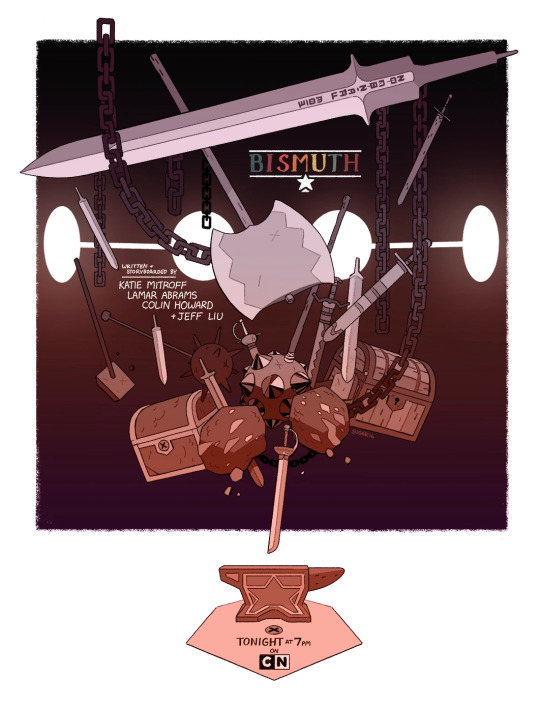
“We are the Crystal Gems!”
I love everything about the title reveal of this episode. I love that we have to wait for it, so we’re forced to pay extra attention when it arrives. I love the not-quite-still shot of our two leads sizing each other up as the name of our episode and new character slowly fades in. And I love the chill but chilling music that sets the stage for the life-changing story ahead of our hero.
Aivi and Surasshu give characters distinct instrumentation, Peter and the Wolf style, but folks like Rose, Greg, Connie, Lapis, Peridot, and even Lion also have distinct motifs (sometimes a few, in the case of Rose and Lapis) using these instruments. The four main Crystal Gems are unique in that they’re defined mainly by their sound: Garnet is the bass holding everything together, Amethyst is the drumkit keeping up the tempo, Pearl is the piano accompanying others, and Steven subs out a traditional main instrument for chiptunes (many people have pointed this out, but I think this video does the best job of exploring it). Garnet as a concept eventually gets a motif that largely appears when fusion is involved, but the principle of associating these four main characters primarily through instruments holds true throughout the series.
Bismuth is a Crystal Gem, too. And whether it’s intentional or not, I love that this is shown by her lack of a distinct theme song, leaving her represented by her instrument in the same way as our big four. And the instrument we get for a heavy metal stuck in the past is a reverse electric guitar.

On the subject of sound, we just started and I've already waited too long to talk about Uzo Aduba. Bismuth is beautifully animated and has a stunning design, and the extra large crew for this two-parter did wonders on her facial expressions and body language to breathe life into the character, but all of it would've fallen short without a magnificent voice actor tying it together. This is a complicated and ambiguous figure, who laughs hard and burns hot but knows how to keep quiet, and Aduba hits every emotional beat with ease.
Aduba is especially talented in humanizing Bismuth’s rage, balancing loud shouts with twinges of sadness and jolly war stories with drops of venom. Her monologue in the Forge is one of many examples of Aduba’s greatness: after building up fervent momentum as she works with burning lava, she lowers her voice to a triumphant but menacing whisper when revealing that she chose to create weaponry. Aduba made a splash by finding a real person in a character reduced to the nickname “Crazy Eyes” on Orange is the New Black, and while Bismuth might not be as extreme of a role, she’s made great by an actress who refuses to dumb down angry women.
Bismuth is a zealot, but why wouldn’t she be? She faced the same oppression that drove the other Crystal Gems to rebel, and is mentally right in the thick of it while Garnet and Pearl have had thousands of years to move on. The leader that inspired and encouraged her to build weapons not only refused to use the Breaking Point, but fought her, bubbled her, and lied about it. We see it in Bismuth’s face the moment Rose is first mentioned around her, and even though this could be read as concern over her leader’s whereabouts, our knowledge that Rose’s version of events clashes with Bismuth’s hiding place sets off early warning bells.

Bismuth’s wordplay here is perfect for a character who often means multiple things at once: “Rose really is something else” works as a commentary on how strange Rose was, as a reference to her physically becoming something else, and as another hint of Bismuth’s true feelings about her leader’s betrayal. Her clever use of language soon becomes ingrained as a character trait: we obviously get the triple pun on her name (not three puns, but the same pun three times), but I’m a bigger sucker for the phrase “upper crust” playing off her disdain of Gem elites with geological terminology. It’s great to see such cleverness when characters with massive frames and aggressive attitudes are so rarely graced with wit.
Bismuth is angry, but she’s more than her anger. It’s balanced by (and caused by) her huge heart. She gets along famously with Garnet and Pearl, and cares deeply for her fallen friends, but she’s just as warm with Amethyst and Steven. An underrated element of Bismuth is that it doesn’t forget that Amethyst is in the middle of a major arc: even though she’s not the focus of the episode, she’s still reeling from her fight with Jasper and is uncomfortable around another huge interloper in her life, this time someone whose existence furthers the notion that Amethyst isn’t a “proper” Crystal Gem. So Amethyst is awkward at first, then sows seeds of suspicion when Steven is entranced. It speaks well of Bismuth that she treats Amethyst as an equal worthy of respect without question, and Amethyst soon comes around when Bismuth praises and upgrades her whip. This giant-sized episode is the clear product of long-term planning and collaboration, but it still remembers to tell a quick Amethyst story to keep us invested in her ongoing development.
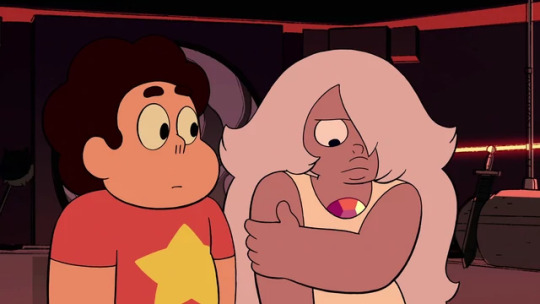
But it’s Bismuth’s relationship with Steven that makes up the bulk of the plot, and as dumb as it might sound, the character she reminds me of most is Tim Curry’s version of Long John Silver from legitimate classic film Muppet Treasure Island; yes, Long John Silver in general works for this analogy, but Tim Curry is the definitive version, fight me. Bismuth isn’t as treacherous as old Long John, but they share the tightrope act of being at odds with young protagonists that they earnestly like. There’s nothing fake about their moments of bonding and pseudo-parental advice, and while both are angling to convert a child hero to a questionable cause, it’s done in part to maintain a friendly relationship. Again, Silver is more of an outright villain—his lust for gold lacks the nuance of Bismuth’s well-intentioned justification of extreme violence—but these are gregarious antagonists that our heroes build meaningful connections with, and ultimately learn lasting lessons from.
Steven is all in on Bismuth’s ardor at first, grinning with shared passion after she rallies the team to keep fighting Homeworld. He’s a little less on board upon seeing Amethyst’s weapon upgrade, and his unease grows during the sparring session, but for all her intensity, Bismuth is fine with him not wanting to fight. She welcomes his own “rituals” with glee, and even though our first look at this sees her spiking a birdie into the sand so hard that the beach explodes, the montage otherwise shows her fitting right in. Even the foreshadowing of Bismuth’s views on weapon lethality during Lonely Blade is lighthearted, with the bonus of showing us how far Pearl has come in regards to fiction since Steven the Sword Fighter.
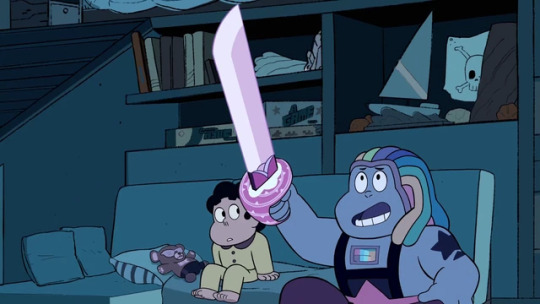
It all comes together in a poignant discussion about Rose. This is the last time she’s ever spoken of in a purely positive light before the story of her shattering Pink Diamond comes out; not every conversation about her is negative after this reveal, it’s never quite the same. We focus on Rose as a champion of differences: this is the Rose who said a servile pearl could be a warrior, who accepted a new fusion when nobody else would, who told a runty amethyst she was perfect the way she was. Bismuth is telling us what we already know, but personalizes it, showing how inspired she was by it, and Steven reacts to this umpteenth version of the Rose Was Great speech by admitting his fears of not measuring up for the second episode in a row.
Bismuth’s response sums up the entire lesson of Steven’s original series arc, and it’s such a moving affirmation when paired with Change Your Mind:
“You are different. That’s what’s so exciting. You don’t have to be like Rose Quartz, you can be someone even better. You can be you.”
The tragedy is that this hopeful message is undercut by Bismuth’s idea that a “better” Steven is one who uses deadly force. And the speech as a whole is further marred by a subtle hint of Rose’s mendacity: Bismuth mentions that she was “just another quartz soldier, made right here in the dirt,” but even before the Pink Diamond reveal, we already know Rose is from Homeworld from earlier episodes like Rose’s Scabbard. Retrospect enhances the sensation, tinging the uplifting speech with the kind of gray that we’re going to see a lot more of in the future.
There’s an awful inevitability to the ensuing fight as our heroes descend into the Forge, coming right of the heels of Bismuth telling Steven they need an alternative to fighting fair. Steven repeats his progression of reactions towards Bismuth all at once: first confused, then super excited, then gradually realizing something isn’t sitting right. But this time we can’t end with a day at the beach.
(The mood is ruined a little by the adorable commercial transition, and the summarization of the scene upon cutting back from commercials in a way this eleven minute show has never dealt with, but fortunately the bulk of the scene goes uninterrupted.)
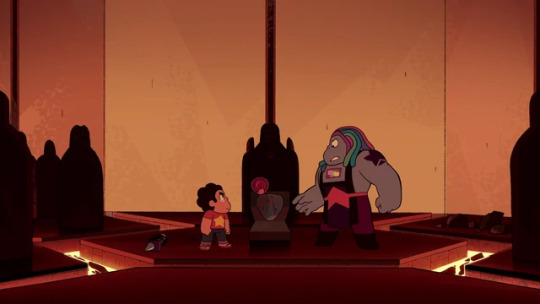
Steven obviously isn’t going to use the Breaking Point, and we get a prolonged shot of them standing at odds in mirrored positions from their title card encounter before Bismuth’s hand tightens into a fist. To her, this isn’t a fight with Steven, but a continuation of her fight with Rose, and her anger at her deception is fueled further by the not unreasonable assumption that Rose is still lying as Steven. In Bismuth’s mind she isn’t attacking a child, but a veteran warrior who for some reason took the form of a small human, so she goes all-out.
Steven has been called “Rose” plenty of times by Jasper, and this will continue in our very next episodes, but it’s gotta sting harder when the person doing it just told him that Steven was enough. And the fight itself is no joke, which is a relief after the brawl in Steven vs. Amethyst was all joke. The hits land just as hard, and we get the same awesome choreography showcasing Steven’s floaty powers and spiky bubble in action, but Bismuth isn’t kidding and Steven is on the ropes. His sandal melting away is as graphic as we’re gonna get, but it’s still a great sign of what will happen to him if he falls. His shoelessness also allows for a neat reversal of Bismuth closing her fist to begin the fight: after limping on the other foot to avoid the heat, the first we see of him after the second bubble of the episode pops is a close-up of his bare foot steaming on the ground. He’s forced to hurt both himself and Bismuth to end the fight.
We’re on the cusp of learning the “truth” about Pink Diamond, but the beginning of Rose’s souring portrayal is right here. If you squint hard enough, Rose’s actions in the past could have been justified by her not wanting to shatter anybody, and by Bismuth being an extremist who left her with no choice. But as she stands impaled by the sword she once forged, Bismuth’s rage can no longer hide her grief. Even if Rose was right, and that’s hardly a sure thing, it’s twisted and terrible that she never told the other Crystal Gems the truth. It doesn’t matter that we eventually learn that this was a lot more complicated than it seemed because Rose was Pink Diamond, because in the moment, the person who just tried to kill Steven is saying that Steven’s mother did an awful thing, and despite everything the show has told us until this moment, she’s making a good point. Steven has no time to dwell on it before the other shoe drops (hopefully not into more lava), but it’s telling that Bismuth only acknowledges Steven as himself again when he says he’ll be honest.
When Bismuth gave Steven his pep talk in the living room, the audience didn’t know her full story, but she did, so she still loved Rose despite everything. She was hurt by her, and was willing to fight her, but she looked up to her leader despite it all. So it’s a real turn when she uses same language that encouraged Steven moments ago to make a new point: he could be better than her because of his potential to be spectacular, but also because she set the bar low by doing horrible things. Bismuth is all about that wordplay.
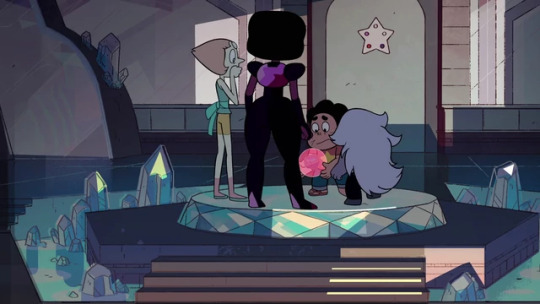
I’ve got a lot to say about my problems with Bismuth’s story after Bismuth (or rather the lack of one) that I’m including in my giant-sized features section below, because a giant-sized episode merits giant-sized features. But within the episode itself, I think silence after the fight is the right choice. Steven has been in danger before, but this is the hardest a person has ever tried to kill him, and it was one of his friends. A new friend, but a friend.
Bismuth marks the beginning of the end of this era of the show, an era when Steven’s series-long arc to fulfill his mother’s legacy was relatively straightforward. In yet another example of Bismuth’s wordplay, his life story swivels around a Breaking Point. The core of Steven Universe may not change in the way it does in Bubble Buddies and Mirror Gem and Catch and Release, but the core of Steven Universe is forever affected. His imminent guilt complex begins with stabbing Bismuth, and despite the hardships to come, he becomes a better person for surviving it.
But at least he doesn’t shatter her. That would really do a number on the guy. Can’t imagine how guilty he’d be if he one day did shatter an imposing zealot from the Gem War days with a history of confusing him for Rose Quartz...
Future Vision!
This is normally a section that lists small bits Fragments of foreshadowing, but because Bismuth is a double episode with tremendous impact on the shape of things to come in ways I already talked about in the review proper, I want to use this space to talk about the elegance of Steven Universe’s structure. I’ve referred to the fifty-odd episode chunks that make up the story on numerous occasions, but I think it’s about time I buck up and call them Acts.
Act I of Steven Universe is the first season, Act II is the second and third season, and Act III is the fourth and fifth season (with the movie and Steven Universe Future as epilogues), and I think viewing the series through this lens really makes the structure shine. There are many examples of repeating themes and moments that this interpretation makes clear, and as an example, I want to talk about how a recurring phrase signifies a turning point towards the endgame of each act.
In Act I, the slow-burning mystery of where the Gems came from begins at the midpoint, Mirror Gem, and escalates in Warp Tour with the introduction of Peridot. But we’re still doing regular episodes throughout, because Steven’s life is bigger than his past and there’s no pressing need to address his alien heritage when it isn’t directly affecting his life. It’s not until Marble Madness when this story ramps up, with Peridot's discovery of our heroes hurtling us towards a finale that sees Steven come into his own to defend his friends against old foes from beyond the stars who thought them long dead. The turning point is marked by Pearl taking a stand to proudly declare:
“We are the Crystal Gems! We're still alive, and we're still the guardians of this planet and all its living creatures!”

Jumping to Act III, the slow-burning mystery of what Rose did to Pink Diamond is actually solved with some time to spare. Things seem to be wrapping up at Garnet’s wedding in Reunited, especially because we’ve reached the same episode count of the other two acts. But then Blue and Yellow Diamond crash the party, bringing together the entire main cast in opposition. As in Act I, this shifts us onto the path towards the finale, this time one that sees Steven bringing the Diamonds together to heal the damage they did on Earth. This turning point was a bit less subtle:
“This is our home! Our planet! Our friends and family! We are the Crystal Gems!”

Act II is more stable than I or III, chronicling the period after Steven becomes a competent Crystal Gem but before everything is turned upside-down. He has adventures befitting his role and helps his friends and family as he grows more comfortable with his mother’s legacy, but unbeknownst to him, it’s the calm before the storm. Through it all, that legacy and that group are the bedrock of Steven’s life, and Bismuth begins to unravel his sense of security, leading to a finale that destroys our hero’s comfort zone. The turning point comes as Bismuth shatters not an elite Gem, but the fake image of one, and roars a battle cry that shows that there are some missing pages in the story of Steven’s happy family:
“Listen up, you Homeworld upper crusts...”
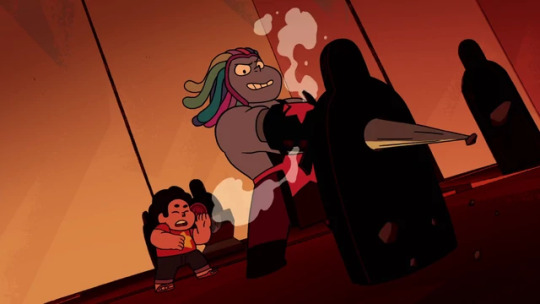
“We are the Crystal Gems!”
If every pork chop were perfect, we wouldn’t have inconsistencies…
Likewise, this is normally a section that lists plot elements that don’t add up, and I can’t imagine reviewing Bismuth with addressing Bismuth’s treatment as the show continues. There aren’t many other places to write about it until Made of Honor, as the most notable element of this discussion is her absence, but it’s a flaw beyond this episode itself, so it’s going here.
First, I understand from a storytelling perspective why Bismuth is bubbled again. She’s a major new element that couldn’t realistically be sent to the barn like Peridot and Lapis, and is so at odds with our heroes that it would mess with the direction of the series. In particular, the reveal that Rose shattered Pink Diamond would go from being a story about Steven coping to a story about Steven and Bismuth coping, because Rose shattering someone goes against the whole reason she fought Bismuth in the first place. The simplest solution to not having Bismuth dominate the upcoming story is putting her away until the plot demands. And we do eventually get some lip service to why she was bubbled again for so long: she did, after all, try to shatter Steven with the Breaking Point at the end of their fight. She seems cool with it, and it’s not as if she was suffering in there, popping back out as if no time had passed and integrating well with the team afterwards.
But it is baffling that there isn’t any conversation about trying to talk with her instead of keeping her locked away. We don’t need a proper trial, but the idea that this team wouldn’t allow Bismuth to make her case and wouldn’t try to help her work towards a mutual understanding is not only cruel, but cruel in a way that makes no sense for these characters. I’ve called the underuse of Malachite the show’s greatest blunder, and I stand by it because Bismuth’s treatment is much more than a “whoops.” Communication is everything to this series, and the idea that Bismuth was too dangerous to be reasoned with is, to me, Steven Universe’s greatest sin.
Garnet and Pearl in particular never mention any alternatives, or even bring her up to a meaningful degree. This is supposed to be one of their best friends. And after we learn about Pink Diamond’s shattering, it’s bewildering that Steven doesn’t consider the Bismuth of it all outside of her factoring into his guilt complex in Mindful Education and a brief mention in Storm in the Room. On both an emotional and logical level there’s no reason to not include her more in Act III. Like, let’s say in the worst case scenario she’s freed and furiously attacks Steven: he already defended himself by himself against her, in a lava-filled arena where she had a huge advantage, so obviously with the other Gems he’d be safe. And let’s say Steven is traumatized by nearly getting killed. Understandable. Even if Pearl also nearly got him killed a few times, it was never with murderous intent. Except that if that’s the rationale, I feel like Bismuth deserves to have that explained by him at some point during her imprisonment. He could tell the Gems, he could confide in Connie, whatever, this is something that needs to be said out loud. If we’re going to have her locked away indefinitely, there needs to be more than stone cold silence about why the Crystal Gems came to such an extreme solution, seemingly without a second thought. There was more discussion about the ethics of bubbling Peridot than Bismuth, and Peridot was a full-blown opponent at the time. There was more discussion about the ethics of rehabilitating the Centipeetle, a being corrupted into what seemed to be an unthinking monster, than a fully sentient ally who did a bad thing.
I’m not gonna knock this episode down any pegs for this in my rankings, because it’s not really the fault of this episode. Yes, it could have included Steven’s conversation with the other Gems, but this story was already full to the gills and there was plenty of time in future episodes, particularly episodes after the shattering story comes to light, to address it. Bismuth works fine on its own, but demanded further stories that it never got. Made of Honor does a decent job of bringing Bismuth back, but that’s after over fifty episodes of a misguided but heroic and loyal friend being imprisoned without any attempt at mediation.
I get that it would’ve been a lot of work, and that the bubble method was more convenient. But making a character this great only to treat her this way is a disservice to both Bismuth and the Crystal Gems as a whole.
(Also, less importantly, this episode was marketed as 100 thanks to the inclusion of a few combined shorts as numbered episodes. But yeah this was totally episodes 98 and 99.)
We’re the one, we’re the ONE! TWO! THREE! FOUR!
I ended on a bummer note there, but like I said, Bismuth by itself shouldn’t be held culpable for not having a Too Short to Ride or Alone at Sea for Bismuth down the line. It still doesn’t make my top fifteen, but it does make my top twenty, which matters because the list is expanding next time to account for our actual hundredth episode.
Top Fifteen
Steven and the Stevens
Hit the Diamond
Mirror Gem
Lion 3: Straight to Video
Alone Together
The Return
Jailbreak
The Answer
Sworn to the Sword
Rose’s Scabbard
Mr. Greg
Coach Steven
Giant Woman
Beach City Drift
Winter Forecast
Love ‘em
Laser Light Cannon
Bubble Buddies
Tiger Millionaire
Lion 2: The Movie
Rose’s Room
An Indirect Kiss
Ocean Gem
Space Race
Garnet’s Universe
Warp Tour
The Test
Future Vision
On the Run
Maximum Capacity
Marble Madness
Political Power
Full Disclosure
Joy Ride
Keeping It Together
We Need to Talk
Chille Tid
Cry for Help
Keystone Motel
Catch and Release
When It Rains
Back to the Barn
Steven’s Birthday
It Could’ve Been Great
Message Received
Log Date 7 15 2
Same Old World
The New Lars
Monster Reunion
Alone at Sea
Crack the Whip
Bismuth
Like ‘em
Gem Glow
Frybo
Arcade Mania
So Many Birthdays
Lars and the Cool Kids
Onion Trade
Steven the Sword Fighter
Beach Party
Monster Buddies
Keep Beach City Weird
Watermelon Steven
The Message
Open Book
Story for Steven
Shirt Club
Love Letters
Reformed
Rising Tides, Crashing Tides
Onion Friend
Historical Friction
Friend Ship
Nightmare Hospital
Too Far
Barn Mates
Steven Floats
Drop Beat Dad
Too Short to Ride
Restaurant Wars
Kiki’s Pizza Delivery Service
Greg the Babysitter
Gem Hunt
Steven vs. Amethyst
Enh
Cheeseburger Backpack
Together Breakfast
Cat Fingers
Serious Steven
Steven’s Lion
Joking Victim
Secret Team
Say Uncle
Super Watermelon Island
Gem Drill
No Thanks!
5. Horror Club
4. Fusion Cuisine
3. House Guest
2. Sadie’s Song
1. Island Adventure
67 notes
·
View notes
Text
A Quartet of Reviews: Missing Link, Pet Semetary, Shazam!, and Hellboy (2019)
Missing Link

As the technical accomplishments and detailed beauty of Laika’s stop-motion films are part of the reason I’ve chosen to study stop-motion animation for my current academic research, you’ll forgive me if I approach their fifth film with some bias. Plus, box office numbers suggest that a lot more people really should be seeing these, so the more voices there are singing Laika’s praises the better, frankly.
Missing Link is notably ambitious in that it strives to deliver an action adventure in the vein of Around the World in 80 Days or The Mummy (the Brendan Fraser one, not the “DARK UNIVERSE” one- yes, that did happen, and it is hard to remember), with multiple thrilling and complex action sequences, all in stop-motion. Given the labour-intensive nature of stop-motion and the limitations you’d typically expect of a medium that’s executed through real models that have a weight and substance to them that makes them less flexibly fluid than cel or digital animation, stories with an emphasis on dynamic action aren’t what you’d typically expect when it comes to stop-motion. And yet Laika demonstrate their full commitment to making Missing Link an energetic blockbuster through impressive choreography and painstakingly realised action set-pieces. While the charming characters and light-hearted tone help you stay engaged with the narrative, you’ll be constantly taken back by the seamless merging of traditional methods and modern technology in the animation which makes you sit up and take notice as you wonder how they managed to put together each scene. The best use of digital effects are the times where you’re not entirely certain it’s even there, and Laika’s approach to this modern tool definitely fits in that category.
The film never quite reaches a point of emotional intensity that leaves me completely floored, as some of Laika’s previous films have managed to do. I didn’t walk away from the film remembering a moment where a character’s vulnerabilities are laid bare or a difficult but essential lesson is imparted in the most brutally earnest way. So, when compared against ParaNorman or Kubo and the Two Strings, Missing Link left less emotional impact on me. Having said that, the film still conveys numerous themes effectively through key story beats and striking visuals, with its central thesis being the importance of learning empathy towards others, and that you shouldn’t seek validation from close-minded proponents of outdated and toxic principles. As such, through a combination of entertaining characters with likable personality, an emphasis on globetrotting action, its refreshingly positive outlook, and tremendous animation on both the large and the small-scale across the board, Missing Link is a delightful adventure that you should make a point of seeing.
Final Ranking: Silver.
Boasting charm, an infectious sense of humour, and perhaps the best action I’ve seen in a stop-motion film, Missing Link absolutely meets the standard of quality that you’d expect from a Laika production.
Pet Semetary
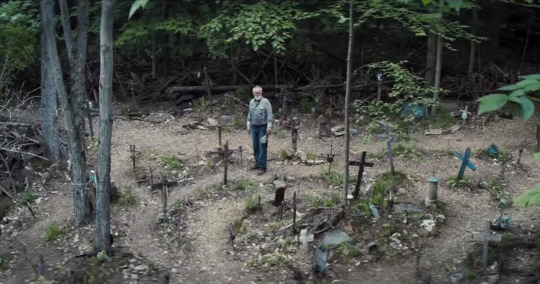
As many other people discussing this film have noted, Pet Semetary is a Stephen King story that’s notable for being so bleak that even Stephen King felt it was too dark. He hesitated to submit it for publishing for three years, only submitting it when he needed to meet a deadline for a contract. In the subsequent years, King has been critical of the “nothing matters” mentality of the story. With that in mind, as well as the knowledge that several people I follow whose opinions on film I trust were not fond of it, I was prepared for the possibility that I wouldn't enjoy it, but nevertheless open to the film surprising me. After all, Stephen King is a consistently entertaining storyteller, and I’m always interested to see how people adapt his work. For a while, things seemed okay enough. Then it started to drag around the middle, and then it took a hard, fast, ugly turn, descending into the most distasteful experience I’ve had in a cinema this year.
As that summary indicates, the set-up is intriguing enough. A family move into a new home, and there are little signs that things aren’t quite right around here, as well as the telltale indications of a traumatic past that have left some of the characters with residual hang-ups that they will inevitably be forced to confront, and the tantalising promise of something unnatural on the horizon that will draw our protagonists in as they descend into horror. It’s competent ground laying work, and apart from the horrifying past of one of the character’s being uncomfortably demonising of the sick, and a lack of a distinctive visual style for the film to call its own, I didn’t have many serious issues with the first third or so.
Once you approach the middle portion of the film, things start to feel protracted. Even if you haven’t seen a trailer or heard the gist of this story and have a decent idea about the trajectory of its narrative, there comes a point where you start to know exactly where things are heading. Discussions of death and what may or may not come afterwards, repeated reminders of how dangerous and unexpected high-speed vehicles on the road outside their house can be, and allusions to some unknowable force that can make impossible things happen which the father of this family absolutely must not approach are all dots that anyone familiar with the phrase “monkey’s paw” can join together with little difficulty. Without an engaging dynamic between characters (a la IT), a self-aware bizarreness that results in humour, or a notable visual style, there’s little to keep you going as you wait for pieces to very, very slowly fall into place.
And the final act is just awful. It spits course language and nihilistic vitriol with little substance or point to its depictions of pain, misery, and spitefulness other than to wallow in this negativity with nothing else to say. Actors start to abandon any semblance of understated nuance in favour of ham-fisted bluntness, cursing out characters with an intensity that doesn’t feel earned as they clumsily fight against them in a way that lacks any sense of climactic satisfaction, and, because your investment in these characters rapidly drains with each new questionable decision and unlikable action, there’s no tension to these encounters either. There are numerous instances where the actors will do their best to deliver lines of dialogue that try to be shocking or wryly dark, but the material is so poorly thought out that it awkwardly misses the mark in both categories. It’s especially galling as the film spent so much time and effort on getting to this conclusion that it was trying to amp up as this big, horrifying finale that will shake you, when instead it’s just underwhelming and unpleasant without any purpose to itself. I was wishing for it to end, and yet when the credits began to roll, I couldn’t help but ask “wait, is that it?” It’s a limp ending with little meaning that leaves a bad taste in your mouth.
Final Ranking: Cardboard.
Pet Semetary’s first act offers some potential, but that’s all it is: potential. The middle act spends so long getting to where it needs to be and where the audience knows it’s going that, by the time it gets there, it spends what little time it has left on cruel, structureless nihilism without taking any ownership for the unpleasant material it lays down at your feet.
Shazam!
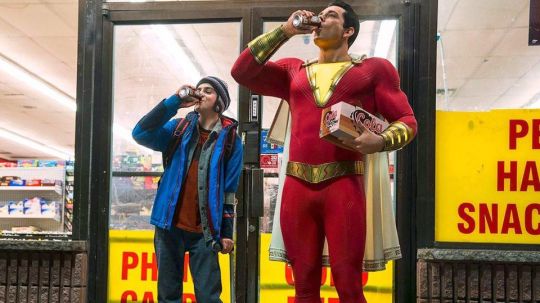
The DC movies are in a great place right now. I’ve yet to see James Wan’s Aquaman, but from the abundance of positive things I hear about it, as well as the profound impact Patty Jenkins’ Wonder Woman had on audiences, James Gunn and a whole lot of appealing casting choices being attached to the next Suicide Squad film, and the great feelings I have about the energy that the Birds of Prey teaser indicated, I’m very optimistic about the future of DC films. Now that Shazam! has released and proved to be a positively uplifting delight, my outlook on this series is cheerier than ever!
Hm? What about that Joaquin Phoenix Joker movie? Well... my feelings towards that are… complicated. I’ll save my thoughts on it for another time, but suffice to say, I think the film has the potential to be great, but I worry about the way it will be received, and that the worst crowd will embrace it and take the wrong lessons from it.
Anyway, for the here and now, Shazam is a refreshing blend of joyous levity and unexpected intensity. The film offers endearing comedy with teens and pre-teens acting like excited kids who enjoy doing dopey things but can still come across as insightful and having an emotional heart to them that makes you happy to spend time with them. But it’s never saccharine and, through a fleshed out script and a cast of sharp young actors and actresses, there’s a clear sense of authenticity which makes these adolescent characters seem grounded and well-observed. Something I appreciated is that, whenever the film goes into background details of the history of magic in this world, grandiose prophecies of mystical destinies, or the villain going into his sinister plans, it’s usually being talked about by grown adults who are taking themselves way too seriously. The best exemplar of this is Mark Strong who plays the villain, Dr. Sivana, with an intensity that deliberately comes across as hammy, and the young characters within the film pick up on this and play off him in a way that deflates his bluster and points out how ridiculous he’s being. As a result, the tone of Shazam! feels like it’s poking good-natured fun at prior DC projects and other big budget action blockbusters where stone faced adults spout clichéd speeches without any sense of self-awareness. It’s an approach that points out how some modes of behaviour that are often associated with maturity and being an adult are actually quite childish when you take a step back. As a superhero film that focuses on the experience of being the age where you’re young enough that you still enjoy being a kid, but old enough that you want to call adults out on their bullshit, Shazam! is impressively realised and fun as hell.
But for as light-hearted as it can be, Shazam! nevertheless surprises you with the occasional brutal sequence that catches you off guard with such rapidity that I found it relatively shocking. It’s not so detailed, gory, or explicit enough that I’d say it goes too far, but it’s worth bearing in mind before you show it to a particularly young and impressionable viewer. The benefit of these sequences is that the unexpected escalation accentuates how in over his head Billy is when he eventually comes across a situation that’s genuinely dangerous, as, despite his newfound powers, he is still a kid, and he really shouldn’t be facing this kind of thing. Indeed, the film demonstrates an impressive grasp of and dedication towards themes of maturity as Billy faces difficult truths about something he thought he wanted and realises he’s been looking in the wrong place for what he actually craves, as well as develops into a more responsible version of himself that opens up to being part of a group built on mutual trust. There’s a cleverly subtle visual indication of the progress Billy has made by the end of the film where he remembers to lower his head as he walks through a door while in his superpowered adult form. One of the first things Billy does when he first transforms is hit his head on a train door to show how unused he is to this new body. The simple act of Billy seeing the doorframe and lowering his head as he steps through without any hesitation near the end of the film signifies the control Billy has developed over himself and his own actions, making his journey of maturation resonate that much more with me. The impact of shocking dark turns and the firm, confident grasp the film has on its cohesive themes of maturation and finding your place in life elevates Shazam! from a fun time to an uplifting and refreshing story that I think people are going to really enjoy for a long while.
Final Ranking: Silver.
Energetic, full of character, and with a strongly executed theme of maturation, Shazam! is highly recommended. It is perhaps a little longer than it needs to be, which results in the latter parts of the middle section feeling a little drawn out. Having said that, the finale sends a jolt of electricity through you that makes you forget any objections you might have and remember all the positive qualities that make this film so likable.
Hellboy (2019)
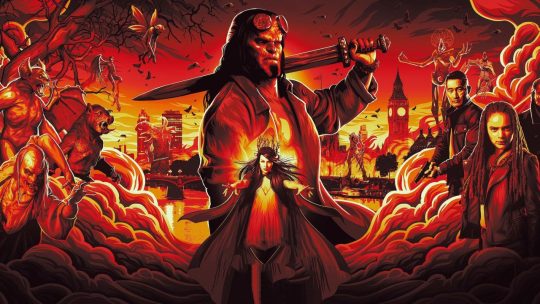
Oof… why did I decide to end this collection of reviews on Hellboy (2019) and write this after three other sections? Sigh… okay, let’s get this over with.
It would be insincere of me to say I'm the most impassioned proponent of the Guillermo del Toro Hellboy films. I found them memorable and atmospheric, and you could certainly feel the characteristic flair from the many people that put their artistic touch on those films to create something unique that marked them out from other comicbook movies, which is especially impressive in the mid-2000s, pre Iron Man era. But after going through the slog that is Hellboy (2019), I think I’m more appreciative than ever of what del Toro and his team managed to achieve.
For a while, it seemed like this new R-rated version of Hellboy was angling for a more faithful adaptation of the original books by Mike Mignola, given the various interviews that were had about it over the years. Sadly, the final result feels like the result of too many outside influences dictating what the film should feature, culminating in a hodgepodge of a film which regurgitates character beats from the del Toro films, and rapidly stitches together a half-hearted attempt at a King Arthur narrative to fill in the requisite new material (this is your regular reminder to check out The Kid Who Would Be King, a much better modern reinterpretation of Arthurian lore). The presentation is dour, unenthusiastic, and lacks any atmosphere or personality, and that is something you could never accuse either the Mignola books or the del Toro films of lacking. In the whole film, there are only two sequences that stand out, namely the fight with the three giants and the rampage of the hell creatures in London. Even so, the former is a relatively meaningless sequence that contributes very little to the narrative and lifts right out of the film, while the latter is so sadistic and mean spirited that it made me genuinely uncomfortable. It falls flat as both an adaptation of a beloved fictional series that’s brimming with atmosphere, and as a piece of technical filmmaking as well.
On top of that, when the tone and general philosophy of the film does emerge out from under the rest of the film’s mediocrity, it reveals itself to be genuinely unpleasant. The film opens with narration that rushes through the backstory with Nimue and the Arthurian set-up and does so with foul-mouthed irreverence. There is a bit of humour to someone casually tossing in the odd bit of shitty language as they tell you about ancient history that should be discussed with pomp and circumstance but is instead being discussed with ill-fitting coarseness. However, there needs to be some personality to go along with it, otherwise it’s implied that the swearing is the character and all that’s there to it. In the case of this opening narration, Ian McShane emphasises each fucking swearword and it becomes clear that the dialogue is using this as a crutch in an effort to make the film seem like it has an identity as this edgy superhero movie that’s different because it swears. It’s a juvenile approach that is laughable when you consider how effortless Ryan Reynolds’ delivery in each Deadpool movie has been, which demonstrates how swearing can be used to accentuate genuinely funny jokes and characters, rather acting as the joke in and of itself.
And this isn’t even the most egregious part of the film either, it’s simply a bad first impression. The worst aspect of the film’s outlook is how virtually every character espouses the notion that you should stop complaining, stop letting things get to or affect you, and stop taking time to process things. This is especially saddening when Hellboy’s father, a character that was played with wonderful vulnerability and heart-aching humanity by the late great John Hurt, tells Hellboy to “grow some balls” and get on with things, making the emotional culmination of their time together on screen essentially boil down to ‘quit your bitching’. Characters in Hellboy (2019) show next to no empathy towards one another, and they continually reinforce the story’s outlook which, whether inadvertently or not, nevertheless encourages a state of being where you never have time to be open or vulnerable with the people around you. It’s profoundly disheartening to watch, and gives little to no thematic or visual sustenance to get you through a runtime that feels far too long.
Final Ranking: Manure.
David Harbour does an admirable job in the lead role and I was happy to at least have a protagonist in this film that captures the gruff sadness and down-to-earth affability of the character of Hellboy. But he’s drowning in limiting makeup and an even more stifling movie that has no visual flair and a boring, miserable narrative. The experience of watching this movie is draining and deflating, and I hope to never revisit it.
#The Inquisitive J#film#movies#film review#movie reviews#critic#film critic#movie critic#film criticism#independent film journalism#missing link#laika#missing link review#pet semetary#pet semetary review#shazam!#shazam! review#hellboy 2019#hellboy 2019 review#the inquisitive j reviews
7 notes
·
View notes
Text
A Dusty Journal
I first knew I had a knack for writing in eighth grade. We had a daily journal entry that kicked off class. Every day, for the one hundred and eighty-two that were spent inside Wyoming Valley West Middle School, the first five minutes in Language Arts class were dedicated to journaling. Each day, a new prompt. Sometimes the teacher would collect them.
I was always under the impression he collected our journals just to peak to verify we actually completed the prompt. One day, I can't remember the season. Or if it was a Tuesday. Honestly, I don't remember much other than the blood rushing to my face when he called my name. Mr Davis, he starts, I was wondering if I could ask you a question in front of the class.
I'm not a shy person, nor do I have much of social anxiety, and this is true, even at the age of fourteen. With cotton mouth, I stammered out the word, sure. He continues by speaking to the class about the importance of journaling. How, by simply jotting a few words on a page, you can focus your thoughts clearer. Potential answers could surface from year long questions. A sense of self can grow and awareness can flourish.
During puberty, things are all messed up. Including, but not limited to, perception. And in this time of my life, not many people knew I wrote. It was...weird for me to tell people for some reason. I guess I felt embarrassed. Perhaps, it wasn't cool enough. Maybe I just wanted to keep it to myself. Who knows.
The prompt had something to do with fulfilling the ending of a story we hadn't finished. He had asked us to write the story's ending our way. He asks me, how long have you been writing? At this point, I begin feeling a little hot and I think I entered the matrix. I couldn't remember when I started writing. I could only remember why. I said, to be honest, Mr. Sholtis, I can't really remember when I started writing...confused, I ask, how did you know I wrote?
He said, ladies and gentlemen, Justin here has written his ending to the story. I've been teaching now, this being my fourteenth year, and I've never shared another students journal before. I told you, he continues, at the beginning of the year that I would never share a word of your journal with another person. Because what's in these pages is for you, and that's what makes this dynamic work. I want everyone to be comfortable here. But with Mr Davis's permission, I'd like to read his ending to the class.
I looked down at my hands for a second, I was rolling my thumb and index finger together, something I still do when I'm nervous. In a class of twenty something, it felt like I had eighty some eyeballs staring at me. Being under the figurative spotlight, and with heavy reluctance, I agreed to let him read it.
I obviously can't remember verbatim what was written, I only remember the gist of it. My story concluded with the protagonist returning home to his broken family. His mother had some sickly disease, his father wasn't handling that situation well, and home was just a place to our main character, not a feeling.
At home, his mother lain on the couch, passed out and breathing slowly. His father was nowhere to be found. He went into the bathroom. I remember describing the flourescent lights. How blinding they were. So blinding that it effected the characters ability to think straight. I threw in some flashbacks. I mixed it in with the present. I remember writing it. so. fast. The whole scene. The words flying off the graphite onto the paper. My thoughts flowing like the Hoover dam had just been released. It felt so euphoric. And in the midst of this poetic justice, our character grabs a razor blade and cuts his wrist.
The scene ends as our protagonist wakes up. He's in a hospital bed. His father is sitting in the chair next to him. His mother wasn't in the room. The father notices his son wake up and asks, what on Earth made you do something like that?! And the last line I'll never forget, the main character proclaims, if you have to ask, then I'm not the problem.
I remember receiving some applause, but overall, the room was tight. The air was thick. I couldn't really gauge whether or not I had crossed a line. I mean, we were fourteen, suicide is a touchy subject in those years. Did people think I was some sort of weirdo? I never really cared what other people think but did they think that? Now the cats out of the bag, I write. How does that look in the eyes of my peers?
Mr. Sholtis thanked me for allowing him to share the prompt. He quickly followed up by asking why I decided to write the ending that way.
I said, that's why I started writing. I felt connected to the main character. I don't necessarily come from the best home, I state. I remember clarifying that it wasn't the worst of homes. I was empathetic, even at the age of fourteen. I matured much quicker than most. I had to. I said, sometimes I don't have any other choice but to write. I said if I don't, I feel weird. I said if I don't, I feel like I could die. So when our character gets a chance to live, it's like me getting to live because I like to write.
That journal day was unlike any other journal day. It didn't last just five minutes. It lasted the entire period. During the remaining forty-five minutes, we, as a class, broke down our barriers that we had unknowingly built. Other classmates shared their insecurities. Their stories. Their lives. Our teacher cried after my response, he laughed at others, he encouraged greatness, and inspired us to never be afraid of ourselves.
I first discovered that I had a knack for writing in the eighth grade, but that's not what's important. In that moment, I truly learned the art of communication. How beautiful it is. How liberating it feels. How necessary it is to connect with who we are and those who we surround ourselves. My story may have been the vehicle, but writing was the tool.
#writing#words#thoughts#creative writing#writers on tumblr#life#spilled words#spilled ink#spilled thoughts#memory#middle school#puberty#communication#love#pursuit of happiness
2 notes
·
View notes
Photo
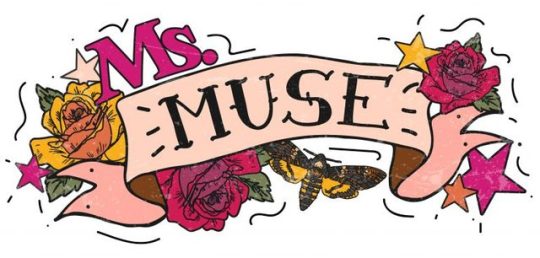
“There comes a point in everyone’s lives where we start to recognize that we are making choices, that we are determining who we are by the actions that we make,” poet, educator and activist Amy King stated in a 2015 speech at SUNY Nassau Community College, where she is a professor of English and creative writing. “What we do says a lot about who we are, not just what we say.”
As a young child growing up in the Bible Belt, King remembers going to the grocery store with her grandfather—her one source of stability, love and unconditional support at that time who, “everyday,” made comments that she was learning to understand were racist. She recalls watching her grandfather flirt with a Black woman who was checking out their groceries. “I was very young,” she told students about that day. “I didn’t even have the vocabulary at that point to recognize this feeling or to articulate what this feeling was, but it was the feeling that something hypocritical was going on.”
That was when King, who identifies as queer, began trying to figure out how to address those moments in her family. “A story begins when a protagonist recognizes a conflict and begins to address how to correct that conflict,” she shared, “and some of us choose not to address that conflict—and that is a story too.”
After growing up in Stone Mountain, Georgia, King lived with her father in Baltimore, Maryland. As a teenager, she worked for the National Security Agency after testing high for analytical skills, but says she felt “uncomfortable” there, even just at 17, and “didn’t like the way the institution was run.”
Two consistent themes throughout King’s life are “social justice and story.” Her latest book, The Missing Museum, is described as “a kind of directory of the world as it rushes into extinction, in order to preserve and transform it at once.” Publishing it won her the 2015 Tarpaulin Sky Book Prize and vaulted her to the ranks of legends like Ann Patchett, Eleanor Roosevelt, Rachel Carson and Pearl Buck when she received the 2015 Women’s National Book Association Award. (Named one of “40 Under 40: The Future of Feminism” awardees by the Feminist Press, King also received the 2012 SUNY Chancellor’s Award for Excellence in Scholarship and Creative Activities.)
King is co-editor of the anthology Big Energy Poets: Ecopoetry Thinks Climate Change and the anthology series Bettering American Poetry; her other books include I Want to Make You Safe, one of Boston Globe’s Best Poetry Books of 2011. Much of her prose, activism and other projects focus on exploring and supporting the work of other women writers, especially writers of color. King is a founding member of VIDA: Women in Literary Arts and former Editor-in-Chief of VIDA Review.
During a 2014 interview King gave for Houston’s Public Poetry Reading Series, she spoke on the subject of trying to understand poetry by asking a pivotal question: “What is ‘understanding’ and what is an ‘experience’ with a piece of art?” She went on to say poetry should “jostle” us out of our regular ways of thinking—it should “undo” us in ways that are both good and uncomfortable.
For this installment of Ms. Muse, King opens up about learning to speak up and step up—and shares three new poems with Ms. readers. Here’s to hoping that they “undo” you.
THE POEMS
Selling Short
I cannot afford to live in the city I teach in,
& the number of people sleeping in cars has grown,
indivisibly. This is not a dream of guarantees
but the pursuit of handwritten freedoms that night the sting away.
Demons of clinics devise distribution mechanics
based on who you were born to & who you might know.
The 2 a.m. quiet promises no solace or silence when days
are hobbled & taken. Soon, light will be privately owned.
I’m Building a Body to Burn My Effigy In
I will not mention stars Today. They have been used
for purposes not their own. Listen to them. Give them space.
Observe but leave them distant. If you think you know everything
about them now, you have outgrown yourself.
In the south we say bigger than your britches burns,
but I do not wish to confuse. I want to learn.
Joy Even
The denim and calico patchwork
of my childhood. Mothballs in a little black box,
felt lining each crevice. Michael Jackson
on a hobbled turntable someone left
at the apartment complex curb.
Costwald Village. Regal.
British. Anything but.
The dislocation of Backwoods, Georgia.
The first time a man touched me,
his semen glistening my inner thighs.
“Thriller” and the plywood coffee table.
The hoarder grocery bag maze
and Childcraft Encyclopedias flayed across the shag.
My 12-year-old amazement.
My 12-year-old embryo.
The fact of a body electric, searing for days.
Turning that birthed another world with a song and dance.
So many ways to joy. Some to death.
My anything. Me, anything. Joy even.
THE INTERVIEW
Can you tell me about your process of writing “I’m Building a Body to Burn My Effigy In,” “Joy Even” and “Selling Short”?
I don’t have one process. Sometimes compiled notes take shape. Or a poem just falls out of me as if, gored, the liver drops from my body. The heart seeping sounds more fitting, but a liver plop fits better.
“I’m Building a Body…” comes from an interest in physics and mortality.
“Joy Even” is part of the slow-burn of outlining a memoir.
“Selling Short” emerges as predictive dream, touching on issues that have recently led me to Rosi Braidotti’s “The Posthuman.”
What childhood experiences with language informed your relationship with poetry?
When I first moved to live with my father in Baltimore at 15, I spoke slowly and heard the same. I often said “What?” in a deep southern drawl, uncertain of my own ears, which was probably also testament to a deeper uncertainty too. My father was my only safety line in a house full of strangers and with a stepmother who, quite quickly, began to play her own uncertainties out on me.
One day, as usual, I asked “What?” and my dad, no longer riding the romance of his daughter’s betrayal of her mother to be with him, the winner, suddenly shouted at me, “DO YOU REALLY NOT KNOW WHAT WE’RE SAYING?” It shocked the shit out of me. I made adjustments over time to alter the way I spoke, how I heard, to absorb unknown word usages and infer what I could. And to recover from what that moment meant.
You might prefer the story of how I used to read Gertrude Stein to friends over the phone to annoy them until I realized I had tricked myself as I was enjoying sounding her poetry aloud. Or how I grew up reading Nancy Drew and science fiction late into the wee hours and then woke up and watched Saturday morning cartoons in black and white. But this moment with my father shattered something. Luckily, the cracks are often where we make things and the broken pieces what we make things with.
I’m stunned by that moment with your father and your struggle to understand what people around you were saying. I’m also struck by the notion of the poet as a young girl not trusting her own ears, as you say. How did you learn to make out the words all around you–and to trust yourself?
I don’t think I ever have really. I just embrace the temporality of life a bit more than usual and go with what comes across. It’s why I am not embarrassed to ask someone to pass the “lotion” for the salad or to verb nouns for decades now. I think subconsciously I suppressed my accent as a response to my father, but that shock taught me that not only is my mother unreliable, but so is the alternative, my father. I had already been disabused of the notion of unconditional love; I was holding out hope in him for at least a lasting, warm embrace. I’ve grown since that bottoming out: DNA is not all, and one can find family—and become family—elsewhere.
This is all linked to the notion that people speak to signal group intimacy; language is shaped by mutual alliances and allegiances. When family rejects your language needs, believe the message it sends and seek anew.
Do you seek out poetry by women and non-binary writers? If so, since when and why? More specifically, how has the work of feminist poets mattered in your childhood and/or your life as an adult?
I won a city-wide fiction contest for Baltimore ArtScape during my senior year of high school. It was judged by Lucille Clifton, which made a lasting impression on me. I was not a writer, but my high school English teacher, Carolyn Benfer, encouraged me tremendously. I was attending a vocational school in the city and, up to that point, was destined to become a CPA.
From there, I attended the University of Maryland at Towson State and had the good fortune to enroll as a double major in English and Women’s Studies. The latter program is especially noteworthy as the program served as the model for many other Women’s Studies programs across the country, as envisioned and spearheaded by Elaine Hedges, who was also an active feminist, affiliated with the Feminist Press. This program led me to numerous marginalized writers back in the early nineties that I likely would not have encountered so early on independently or simply from core English classes.
I cannot speak highly enough about the work that Women’s Studies program did. The short answer is that the program taught me to seek work by marginalized writers as I would be missing out on so much otherwise. I do not seek literature simply to reflect my own experiences—I seek to learn beyond them.
What groundbreaking (or ancient) works, forms, ideas and issues in poetry today interest and concern you?
There is no one work, and as such, I continue to read widely. There are so many books I have not read yet, which is thrilling. Some of my touchstones range from Cesar Vallejo to Leonora Carrington to Audre Lorde to James Baldwin to Lucille Clifton to Gertrude Stein to John Ashbery. There are numerous younger poets I look to for energy, shifts in consciousness and awareness of current cultural concerns and who also signal structural and formal changes. A handful include Billy-Rae Belcourt, Chen Chen, Joshua Jennifer Espinoza, Vievee Francis, Airea D. Matthews, Raquel Salas Rivera, TC Tolbert, Ocean Vuong and Phillip B. Williams—but this by no means is an exhaustive list. Check out the poets anthologized in the Bettering American Poetry series I am lucky enough to be a part of.
As a woman, and as a woman who writes, what do you need to support your work? What opportunities, support, policies and actions can/could make a direct difference for you—and for other women writers you know?
Besides the room, money and time Virginia Woolf called for, I’m beginning to find that a support network is vital. I don’t think this needs to be formal or a writing collaboration. I simply mean that it is encouraging to have regular check-ins with a small group of writers, as few as two even, where you discuss what you’re each working on, maybe share a small piece/excerpt, get feedback and discuss ideas.
It is often the idea exchange, even with just a friend on the phone, that I find generative. I find myself articulating ideas and vision in a way that is as revealing to myself as to my friend. I leave those conversations with ideas of where to head next with a poem or on what to research to build foundational ideas for a concept.
What’s next? What upcoming plans and projects excite you?
I’m outlining a memoir—fingers crossed—and writing poems. I may birth an essay down the road, but that is gestating for now. And volunteering time and support to a program called La Maison Baldwin Manuscript Mentors, a nonprofit arts and culture association that remembers and celebrates James Baldwin in Saint-Paul de Vence, to save James Baldwin’s house and turn it into a vital residency in France.
How has the current political climate in the U.S. affected you as a woman writer?
I am not so much shocked as often startled. I think we all knew white supremacy, colonialism and toxic masculinity were at the helm, but the built-in invisibilities kept them shrouded in respectability politics and notions of civility, and of course, that begs the question: Whose civility? I also don’t think we are in some unique moment of history where shocking things have taken hold and the end is nigh, but that is how it feels at times. Power and paradigm shifts are often premised on tectonic shifts, and folks have to finally step up, choose sides.
That seems key at the moment: one can no longer pretend to be above the fray. And that may be most painful for those of us with privilege. No one is outside anything after all.
TAGGED:
INTERVIEW
,
MS. MUSE
,
POETRY
MS. MAGAZINE FEATURE - CLICK HERE - HTTPS://MSMAGAZINE.COM/2019/02/28/MS-MUSE-AMY-KING-POWER-STORIES-WEIGHT-CURRENT-POLITICAL-MOMENT/
2 notes
·
View notes
Text
📕 Book Review 📕
What Moves the Dead by T. Kingfisher
Rating: ⭐️ ⭐️ ⭐️ ⭐️/5
Eyyyy, I read another book! A real one, with words and for adults and everything. This one will go without a cover image, but let’s talk about the book.
A special thank you to Netgalley and Macmillan-Tor/Forge / Tor Nightfire for providing me with a digital ARC copy of this book in exchange for an honest review.
I will be judging this book on its own merit, and not as a retelling of The Fall of the House of Usher. I have not read The Fall of the House of Usher in ages, and as such, I can say with certainty that this book stands easily on its own. I probably should re-read it, as it’s only forty pages apparently, but I digress. (I did sign up for Poe Daily, so with hope, maybe it won’t be long before I do re-read it)
I found the descriptions in the book to be wholly unsettling, which T. Kingfisher is exceptionally good at. There is a mystery afoot, but it’s not a whodunit. It’s intriguing, it’s Gothic, it is dark and brooding and I believe the uncanny horrors thoroughly and without question. The writing is so exceptional that I am very excited to dive into T. Kingfisher’s other novels. I have full faith in her to unnerve me with beautiful, poetic, but unsettling words and descriptions. I trust in her sense of a slow, drifting horror. I would recommend to not read this whilst eating, which was the mistake I made earlier, and if you will be eating anyway, I'd stray away from cold lox straight from the package. T. Kingfisher does not shy away from her descriptions, no matter how gruesome, and I love her for that.
Alex Easton, our protagonist, goes to visit dying childhood friend Madeline Usher, and is immediately aware that something is deeply wrong. The falling, crumbling house of Usher holds many disturbing secrets, and Alex Easton is determined to learn what has caused the immediate decline of Madeline and Roderick Usher, and their growing madness. Something else seems to be growing too, a dark, uncanny horror slowly enveloping the house and those within it.
My biggest issue with the book is the lore. The worldbuilding. Yes, America and England do exist. It is almost our world. Except, there is Gallacia, and Ruravia. There are Gallacian words, pronouns, a language made up of bastardized loan words from other languages. There is a humor to the Gallacian protagonist’s tear-down of their own country, a snide remark here and there to express the vast differences between places. Perhaps the use of fake countries was a means to hand wave away other things, such as the fictional mushrooms and their way of functioning. The author’s note states it to be a sort of nod to a sort of Ruritania romanticism, something I admit I was not overly familiar with, and decline to directly comment on as I’m not well-versed in that knowledge.
Alex Easton, our protagonist, goes by Gallacia’s genderless soldier pronouns of Ka/Kan, which is probably more confusing when our narrator explains that there are seven sets of pronouns, depending on if you’re a child, a nun, a soldier, a man, a woman, God, etc. however, none of these other pronouns really focus much. Occasionally the pronouns for children (va/van) is referred to, but the others are simply mentioned and then never really brought up for use.
The lore isn’t so much of a problem if this were a bigger book and it was sprinkled in subtly, but the story pauses at times so the narrator, even in the middle of expressing the horror being experienced, can explain the history of Gallacia, or the language, or the alcohol in Gallacia, or whatever else needs to be explained as it comes up. At times it's like the main character pulls down a map of the world and says “I don’t blame you for missing Gallacia, it’s so small on the map. A blip. It’s this many miles from Gallacia to Ruravia, if you take a horse, and a hundred years ago, this happened, and it mattered to the history of the world, but probably wouldn’t affect the story if we took it out and set it in a rural English countryside regardless, or never explicitly stated where in the world we were anyway.”
In all truth, the lore feels more like it exists to explain the nonbinary main character and the pronouns used. Frankly, it almost implies the nonbinary-ness of the character couldn’t exist in our reality, but only in one where many rules had to be made up to make it acceptable. Nonbinary people cannot exist without this country and the concept of genderless soldiers, or so it seems to be. I don’t imagine that was intentional, but at times, with how many times it has to be explained even within the first half of the story, I find it… a little inauthentic, but I understand the place it comes from and I genuinely appreciate the representation nonetheless. It’s not often I even GET a book with a nonbinary lead. I just wish that fact could’ve existed on its own merit, as if it didn’t need to be explained. That Alex Easton is nonbinary, and that’s all there is to it, and it’s nobody’s business but Alex Easton’s.
In a larger novel, original, without hint of America, England, Beatrix Potter (well, specifically her aunt, made up for the story, but it’s still implied Beatrix Potter is also a part of this world), I would’ve forgiven the worldbuilding aspects introduced. Language, culture, neighboring fictional countries… but it is wholly out of place in a short horror novel where a good, uninterrupted flow is important for keeping tensions high. As per the author’s note, T. Kingfisher seemed to very much love the character of Alex Easton and ka’s culture, and must have had fun writing kan, but I can’t help but think those aspects could’ve served better in a full-length original fantasy novel where they would have the time to shine. Had they been omitted, this would have made a magnificent short story that would’ve gone straight to the heart of the horror at hand, without constant pitstops for Gallacia history lesson.
I will avoid spoilers, but highly recommend you avoid this book if you cannot tolerate to read about animal death, death of a friend/loved one, gore, or body horror.
What Moves the Dead will be officially published July 12 2022, and I highly recommend it if you want a horror novel that is reasonably unsettling, descriptive, and perfect for a dreary, rainy day. It’s a short read, at about 176 pages. It’s currently available to preorder, or request it at your local library! (As a library assistant, this is a necessary plug for you to support your local libraries as well.)
#book review#book reviews#what moves the dead#t kingfisher#horror review#horror novels#horror Novella#rae's ramblings
1 note
·
View note
Text
Aho-Girl - Episode 04
I have a job to do. And that job is looking up fighting game moves to describe how we do violence. It’s Aho-Girl, episode 04! Here we GO!
-We begin with the blonde rude boy, Kurosaki Ryuuichi. He’s a substitute shin—
-Wait wrong anime. He’s one of Yoshiko’s roughest, toughest foot soldiers! That’s even dumber, guy.
-Opening! With our protagonists on fans for some simple paper theatre.
-So Ryuuichi is trying to fight A-kun, and A-kun is holding him back even with a Yoshiko dangling off his back and egging it all on…When a few neurons actually manage to rub together and Yoshiko remembers she has a drama she didn’t set to record! She’s got to get home! Which leaves Ryuuichi to fight A-kun—
-SA SERU MONO KA
-Ryuuichi goes down hard, and is kind of into this.
-New scene! Yoshiko is helping at a hero show at a local department store to see the Pachi Rangers…And she invited the kids form the park. Who are wise and worldly enough to be humiliated here despite their young ages. The horror in their faces is kind of amazing, and then they’re getting yanked up on the stage…And this poor foolish girl Nozomi wants to follow in Yoshiko’s footsteps! No, don’t! “It’ll ruin you as a human being!” I mean the little boy isn’t wrong.
-Out comes the villain type, and young Nozomi gets ‘taken hostage’, as Yoshiko plays things up for the kids…Except she gets a little too into it, and is ready to fight this villain herself?! The little boys have to try and hold her back, which they fail at utterly as she takes to the stage. She yanks her novelty mask over her face to HENSHIN…
-As the boys realize, with growing horror, what could happen here. If Nozomi gets saved by Yoshiko, her hero worship will grow stronger. She’ll start to imitate Yoshiko. They’ll have another, smaller Yoshiko to deal with! They can’t let that happen! They have to step in the way, and be the heroes instead…As Yoshiko drops masks onto them! Masks they do not want.
-Also the villain actor gets an actual FALCON PUNCH to the stomach from Yoshiko, which he is not happy about. The boys have to rush in and be like “look go down to us do not let Yoshiko be the one to get the killing blow mister please”, JUST READ THE ROOM and read the room he does! The crowd goes wild, and Nozomi is finally free and…Totally hero-worships Yoshiko. Keep fighting, young boys, for Nozomi’s future.
-New scene! Ryuuichi again, who’s going through Yoshiko’s rough tough training to master befriending Akutsu-aniki! He’s learning to be A-kun’s faithful dog and Sayaka can only watch in horror and disbelief.
-New scene! It’s Yoshiko’s teacher, trying to get her failures through to her, and she’s slowly but surely losing her shit. And all A-kun can do is watch in horror. Math is a lost cause, and when they try language, we see the first signs that Yoshiko isn’t so much just “dumb”, as “entirely separate from the assumptions of reality”. Given a simple test to read a tiny story and feel out the emotions of the characters, she instead insists that they are more complicated people than this story portrays, and somehow it turns into an accusation towards the teacher that she’s never been in love!
-Smug Yoshiko face is like nails on a chalkboard. Oh and she ate so many bananas she’s about to hurl. But see? You couldn’t even figure out her true feelings, let alone those of the characters in this story! Oh god her logic is starting to make sense to the teacher, as her entire faith in everything gets rattled! She’s going into shock.
-Yoshiko broke her. And A-kun tries to put her back together, as she…
…
o o o
-I don’t know what I expected.
-But this was not it.
-She wants him to teach her about love.
-This 28 year old teacher is trying to seduce one of her own students, that’s how bad Yoshiko broke her.
-So he tries to turn her down. Is it because you don’t like older women?! FOCUS AND GET A HOLD OF YOURSELF, don’t let Yoshiko into your head! But she’s never been any kind of love, how can she understand anything?! And he has to unleash a BRIGHT SLAP to try and clear her head, which sends her spiraling to the ground, as Yoshiko mindlessly eats a banana and tips herself over into spraying banana juice everywhere. Please recover, sensei, you’re the only one still willing to deal with Yoshiko…
-New scene! Ryuuichi is facing his final battle, as he kneels before A-kun, begging to become his servant! A-kun is very confused, but finally relents. Ryuuichi has become A-kun’s dog! Wait didn’t this start with wanting to be his friend? (Also I was going to pull an amazing reaction shot from this scene but mocking Ryuuichi’s confused feelings felt a little too mean)
-New scene! It’s the day before A-kun’s birthday, and so Yoshiko wants Sayaka’s help to break into his bedroom and find evidence of what to get him for his birthday! But, but he’ll be furious…Yoshiko is used to it! Sayaka isn’t!
-And cue the disciplinary committee president, or Boob President as Yoshiko calls her. She heard everything! And so she’s going to…
-Report them to the authorities?
-Tell A-kun so he can stop them?
-Dangle this as blackmail to get them to behave properly?
-Nope she wants in. She wants in that bedroom with a sleeping Akutsu! Are your feeling for him as huge as your boobs? …Yes? THEN YOU’RE IN!
-So that night, it’s the leap across the balconies…Where they find that A-kun has trapped the door. And Sayaka ends up being the one to stop the trap from killing them outright as a huge weight with a spiked bottom falls, and she’s got to catch it…
-A-kun is sleeping like a baby…And as Sayaka and Yoshiko hunt, Boob President just watches, getting ready to take a shot of him asleep…Also Sayaka has to keep desperately keeping A-kun from waking up. Earplugs when Yoshiko shouts, a sleeping mask when Boob President’s phone flash goes off, and Yoshiko found A-kun’s underwear! Boob President needs those boxers right now, as her duties as the disciplinary committee president!
-The noise of their resulting fight leads to Ruri bursting in to demand her brother keep it down…And then she gets FLAME CHOKEd right into the door, knocking her out cold. So, uh, that’s a problem. Thus comes the desperate attempt to hurry up and get out of here…As Yoshiko cuddles up to A-kun! Boob President demands to join in, and Sayaka can only watch this madness, as Boob President ends up putting THE PEOPLE’S ELBOW right into A-kun’s stomach, and he finally awakes, with a demonic fury heretofore unbeknownst to humanity!
-And Sayaka’s own frustration comes out as she herself just wants these damned idiots to STOP AND THINK for once in their lives! Even A-kun feels apologetic for how he upset this poor earnest blonde who really did just want to find a way to do something nice for him.
-Mission Complete~
So we’re just on the damn escalator, then. Gonna keep escalating. Is that right?
1 note
·
View note
Text
zine thoughts pt 2
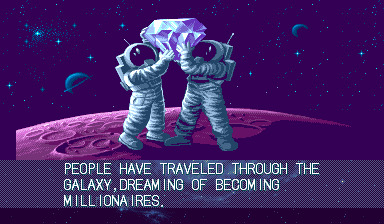
where do you sell videogames? zine fairs, children's book stores, used record marts, from the trunk of a car like rudy ray moore, on etsy or on craiglist, with flyers on the wall of the local chip shop or library. through awkwardly hammered-together handmade electronic systems or the reverse, turning your game into a jumbled set of paper text and graphical fragments which can be sold in boardgame stores as some kind of reconstruct-the-narrative puzzle.
you could make one-off bespoke games or game simulacra for movies that want to depict some kind of videogame being played onscreen without having to go through the licensing rights. you could ghost-develop games for wealthy people to put their names on ("american mcgee presents my life with princess diana by donald duck").
you could develop training games for the military-industrial complex, ha ha ha ha. you could get funded by the CIA to ensure the medium of videogames remains sufficiently arty and rehabilitated to function as propaganda for capitalism... i mean we already know they were involved with the paris review and iowa writer's workshop and all that jazz so they gotta have least a couple people on the payroll already, right, and we will all be treated to some very entertaining revelations following the inevitable freedom of information act request 15 years down the line.
you could try connecting with the little self-contained fan communities for things like touhou, fnaf, undertale, m-minecraft, like those renaissance artists who had to drop their patron's face in the background of some religious scene except in this case it would be one of the homestuck guys. you could make "trainers" for more popular games, or demos that could show how they "feel" without a $60 investment.
you could sell small games as assets for larger ones that want to have some kind of in-universe playable arcade system without having to invent a whole new game from scratch. you could just make extremely specific forms of pornography, maybe not the worst option even, just make sure the very artistic sequences of the protagonist remembering his dead wife are broken up every now and then with scenes of him unhinging his jaw to swallow and slowly digest another, smaller sad games protagonist whole (with rumble function for controllers!!!).
you could make games for all the people who are still on windows xp or earlier or have some kind of arcane video card setup that prevents them playing anything other than that one preinstalled pinball game. you could try selling them at street vendors. you could try learning another language and making games for non-anglophones that don't sound like an english-written game that was localised without much thought after the fact.
you could make games for kids in the hopes that they sexually imprint on them enough to support your erotic oil paintings of the characters 10 years later, just like nintendo. you could make an extremely interesting and thoughtful videogame and then offer not to release it if the donation threshold is met, thus sparing people the emotional obligation of having yet another thing on their should-play-this-eventually list. you could develop games with some bewildering system of in-game and real-world currency interactions and then sell it to the mob as a way to launder money.
you could make videogames that robots record themselves playing to upload en masse which are then watched by other robots as part of some weird, ungraspably abstract SEO economy, or better yet make robots to make the videogames as well. you could make virtual cemetary plots either private (downloadable exe) or public (hosted on the server) with their own customisable mood-themes and weather settings (dark, stormy, remember-you-will-die; sunny, quiet, circle-of-life etc). you could make prosperity orbs.
you could make games for office workers or call center staff which resemble excel documents or phone system frontends from a distance. you could make games which really ARE excel files, some dense collection of interlocking hidden formulas that change to display text and ascii characters as you tab your way through. you could probably talk your way into "adapting" any of those old IPs that still float around long after anyone stopped having any particular thought or feeling about them at all, like the flintstones or ziggy or something, maybe do like those 1960s superhero cartoons where they just filmed panels from the comics - just break a 2d flintstones cartoon into constituent elements and have them hover around in a little cutout diorama that you fly thru, possibly explained in-universe as representing the 4-d vision of the great gazoo. you could make games that play themselves, for the depressed. you could become a ghastly serial m**derer where after each crime you upload a new game to itchio which will reveal the name of your next victim, and costs only $9.99, and of course everyone buys and plays it because the police have put up a reward for solving the crime because they can't get past the dinosaur on level three, and all seems lost until some plucky young computer student who found the game on a friend's hard drive manages to solve the riddle hidden within the game's structure, following the clues, to an old castle, she knocks on the door, it's opened by, yes, it's will wright, wearing a wizard outfit, who tells her that by dint of solving all the puzzles she is now invited to join that mysterious organization known as "The Elect" which is assembled from the finest minds in all game design with a view to secretly controlling the world economy (via "werewolf blood", somehow), that she need only complete the ceremony by sacrificing one untutored soul, he holds out an ornate knife, she hesitates........

the question is where to sell videogames rather than how because for the most part we already know how - there are a million more or less instructive articles out there about hitting up conventions or talking to the press, and it's not that they're wrong, exactly, more that they expect to be applied in an environment that no longer exists. but what should preface and qualify the idea of sheer volume swamping the indie games market is that, outside of a few small pockets, there never really was an "indie games market" to begin with - indie games drew and mostly still draw on the existing videogames market, rather than constituting a new one. it's telling that the glory days of indie games were just the ones where they were able to draw upon some of the same privileges larger titles already had in the ability to access that same audience - being frontpaged by steam, say, or making it onto a comparatively closed console platform, or generating earnest thinkpieces... you could say that they were tapping into structures the industry had already built but had not yet occupied to full capacity.
of course there are exceptions and various efforts to set up new economies for small weird interactive things (like patreon, or game bundles), and some efforts to reach outside the existing games audience likely were successful - but when we think of indie games "functioning" economically, whether that means supporting a small team, a single person, or just hitting minimum wage per hours spent, i believe we're mostly still talking about ones which are built around the existing games economy. which is fine, but i think it's also intrinsically precarious in ways which maybe get glossed over in discussions of the "indiepocalypse" - are all those new steam releases really causing a problem or are they just exacerbating a structural limitation which was already always there, a reliance within the indie game economy on a certain lucky-few-ism which just became grossly more noticeable the more disproportionate it got?

of course it's easier to be dismissive after the fact, and my fantasy about "where" to sell videogames is partly a fantasy of them having a location to begin with - of attaining something of the grounded and immutable appearance of the non-digital, as though brick and mortar stores don't have a relationship to the likes of amazon as basically precarious as any online storefront. and there are also real and obvious reasons why the various videogame audiences all tend to clump together - similarities in terms of the hardware required, the inputs allowed, of visual and cultural reference points, to say nothing of the personal / professional histories of the people involved in each. we are all contained within "the medium"...
so maybe it's also a fantasy of starting to pick apart that conception of the medium. i think small game developers already have more in common with artists or musicians working on the fringes of their respective industries than they do with even moderately successful teams within the same format, and use similar language, engage in similar forms of practice - particularly as near everything comes increasingly mediated by the digital these days. i think they already ARE working in similar spaces to some extent, whether it's social media sites or digital storefronts or meatspace stores pushed by necessity not to specialise. and without wanting to be paranoid (or moreso than the CIA thing, at least) i think we should be cautious of the way a certain focus on mediumicity can obscure these overlaps. a "new medium" is one which inherently pushes against the image of one as grouded ahistorically in some eternal human verity or other (where each medium supposedly embodies some different mode of perception / medieval humour / ninja turtle etc) - it is to see firsthand the way in which supposedly eternal, neutral qualities are materially constructed, which includes seeing forms of social organisation and usage become mystified into extrahuman conditions. and given their basis in technology that includes drawing from wider trends in the use of that technology as a whole - which specifically, in tech circles, can mean more and more tightly interlocking systems of proprietary knowledge and speculative capital, as well as "new mediums" constructed so as to be inseperable from some storefront, website or monitoring technology.
i don't think anybody will necessarily break even taking their games to a zine fair (not that they're breaking even now). but i do feel like trying to build networks across those medium boundaries could be more valuable in the effort to build some sustainable environment for these things than any amount of reform within the house that tech built.
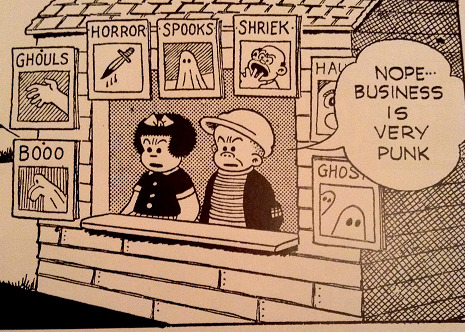
[PS: it occurs to me that you could plausibly argue that the very bagginess of medium-centric formulations is what makes them valuable, in forcing many different groups to butt against each other on one platform rather than just disperse into echo chambers. but i think exactly the reverse is the case: nobody really engages with each other's work in artgames because the stakes are simultaneously too small and too large. they're too small in that however much i might be picky about another person's work - and i think it's this vague pickiness or sense of not-quite-right-ness that drives the most searching critiques - it still feels pointless to pursue that instead of the glaring, omnipresent faults of the big AAA players, which means more complaining about far cry for all eternity. and they're too large in that most small game development is so precarious that it's not really worth the risk of knocking someone out of the circle over penny-ante shit. only with both economic security and broad similarity of outlook can a truly vital, human culture of spiteful cattiness begin... our day will come]
(image credits: Eco Fighter, World Heroes 2 ,The Space Adventure, Nancy)
17 notes
·
View notes
Text
TerraMythos' 2020 Reading Challenge - Book 2 of 26
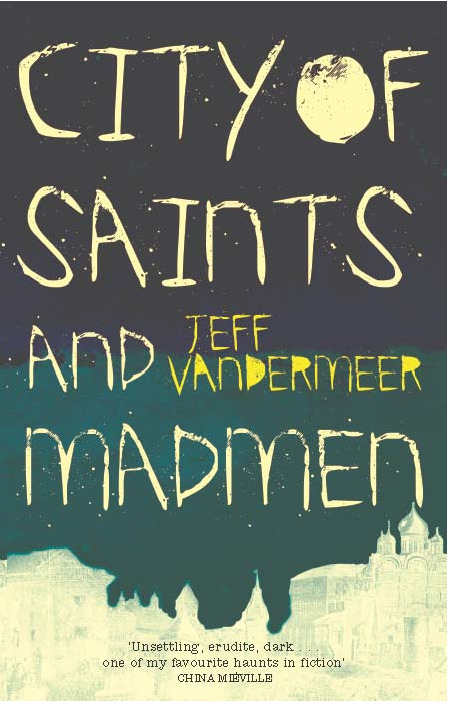
Title: City of Saints and Madmen (Ambergris #1) (2002)
Author: Jeff VanderMeer
Genre/Tags: Weird, Short Story Collection (kinda), Horror, Fantasy, Metafiction, Mushroompunk (yeah), LGBT Protagonist, First Person, Second Person (sort of), Third Person, Unreliable Narrator.
Rating: 8/10
Date Began: 1/7/2020
Date Finished: 1/17/2020
This edition of City of Saints and Madmen is a collection of 4 short stories and a massive “appendiX” of other stories/notable worldbuilding pieces, all of which explore a fictional city called Ambergris. Ambergris’ world is not unlike our own, with technology that somewhat mirrors ours, but is nevertheless distinctly surreal and fantastical. One Ambergris’ most notable elements are creatures called the gray caps (or “mushroom dwellers”), who are basically humanoid mushroom people that play a role in each of the stories.
More details and a look at each of the stories under the cut.
Surely, after all, it is more comforting to believe that the sources on which this account is based are truthful, that this has not all, in fact, been one huge, monstrous lie? And with that pleasant thought, O Tourist, I take my leave for good.
I’ve read VanderMeer before-- the Southern Reach trilogy (which he’s most well known for) is one of my favorite series of all time. While I haven’t seen it yet, the film Annihilation is loosely based on the first book, and I hear it’s quite good as well. This will be my first foray into other stuff he’s written.
While this may put some people off, one thing I really liked about this book was it DIDN’T paint a clear picture of Ambergris. Each of the stories focus on particular details their respective protagonists find important, so the view we have of the city is always incomplete. There are tenuous and sometimes contradictory connections between the stories that often made me wonder what’s true/real, a recurring theme throughout the stories. Several of the stories are works of fiction within Ambergris, which skews perceptions even further. To me, all of this made the setting much more interesting, and the actual revelations more rewarding.
My personal favorite stories were The Hoegbotton Guide to the Early History of Ambergris, The Transformation of Martin Lake, King Squid, and The Cage. I’ll go into more detail on all the individual pieces under the cut, but rating them individually doesn’t much sense due to the weird format.
The Main 4 Stories
Dradin, In Love
An unsuccessful missionary priest named Dradin comes to Ambergris to plead assistance from a former mentor. However, when he spots an unknown woman through the window of a shop, he becomes convinced he is in love and becomes obsessed with her. As an event called the Festival of the Freshwater Squid looms, the city itself begins to change in startling ways.
From what I can tell skimming other reviews, this one trips people up because Dradin is just... a piece of shit. He’s terrible. There are some sympathetic traits to him -- he’s a fish out of water with no one to help him, he had a traumatic childhood, etc. But the more you learn about him the worse he becomes. He believes he’s superior to pretty much everyone he meets, has committed various atrocities you gradually learn about in the story, and he believes he’s in love with someone he’s never met and spends a great deal of the story fantasizing about her and their future relationship. It’s pathetic-- but it seemed pretty clear to me I’m not supposed to like him, so I read the story knowing that.
Anyway, this wasn’t my favorite, but it is an interesting introduction to Ambergris. It’s from the perspective of an outsider, so alongside Dradin you learn things about the city such as the various religious sects, the gray caps, and the Festival. It is jarring when the Festival starts out as this whimsical parade and then goes full Purge for the rest of the story. That feeling pretty much lasts the rest of the book.
The Hoegbotton Guide to the Early History of Ambergris
The conceit of this one is that it’s a travel pamphlet written for tourists to provide a quick rundown of Ambergris’ early history. But the writer Duncan Shriek is so obsessed and passionate about the subject that he goes into way more detail than necessary. He also makes extensive use of the footnotes (often longer than the actual page) to (1) insult the reader, who he assumes is a stupid tourist who will skip them, (2) go on long rants about various other historians, and (3) go into intricate, intense detail or speculation about seemingly innocuous things in the main text. Honestly relatable.
Personally, I love a good history text, so a well-done fictional one is lots of fun. The stylistic choices are engaging and a great characterization tool. The “story” really came together for me in the third act. Super eerie and surreal, and a lot of details about the gray caps and a vast underground kingdom-- but there’s still a sense of unreality, because the account exploring this may or may not be a fake. Anyway, I really enjoyed this one.
The Transformation of Martin Lake
This one is technically two stories at once. Martin Lake is an unknown painter looking to make his big break in Ambergris, when he receives an anonymous letter inviting him to a beheading. Alternating with these novel sections are excerpts written by art critic Janice Shriek (recognize the name?) which analyze the creepy and grotesque paintings made by Martin Lake-- Ambergris’ most famous artist.
This piece was by far my favorite of the main four. Janice evaluates various paintings created by Lake and speculates on the meanings behind them. The Gothic horror story sections star Martin, and the events within reveal the true origins of each painting. The horror story is very creepy and well written, and I really like Martin more than most of the protagonists. It’s also amusing to see just how incorrect Janice’s analyses are. Overall this was a very well structured and entertaining read. (Side note: to whom it may concern, this is where the LGBT Protagonist tag comes from.)
Also, Janice and her brother are apparently the central characters in the next book? I enjoyed both of them so I'm excited for that.
The Strange Case of X
A psychiatrist interviews a mental patient known simply as X, who believes he has invented the world of Ambergris, and he’s actually from a place called Chicago.
I'm torn on this one because I feel I accidentally ruined it for myself. The premise sounds like a pretty cliche setup, but there's a twist at the end that keeps it interesting. The only problem is I went into the story assuming that twist was the case. It's not even like I guessed it or picked up on hints or whatever... I just assumed the twist for whatever reason, so I got to the reveal and was just like "...yeah?"
Anyway, this one’s a good read, just not my favorite. X is obviously a fictionalized version of VanderMeer. I didn’t find him as important in the context of this story, but notes found in his cell make up the appendiX. I *did* really enjoy the story excerpt within this one that starts like a children’s book with very simple sentences, then slowly evolves into more complex language over time until it’s like the rest of the book. The swap between third and first-person in the story, then the narrator commending himself on how clever he is, was pretty funny and good characterization.
The appendiX
Dr V’s Note + X’s Notes
Technically this is 2 “stories” but they’re presented together. Dr V’s note is just an outline of the stories in the appendiX, which are apparently various notes, pamphlets, writing journal excerpts, and pieces of paper he found in X’s cell. He speculates on the meaning behind some of them. It’s a handy reference that I turned back to a few times. X’s Notes are literally just some misc author’s notes/ideas. The final note, though, draws back to the surreal scene I mentioned from The Hoegbotton Guide, which implies it is in fact real.
The Release of Belacqua
This one is about an actor named Belacqua who’s been typecast into a specific role, which he plays every single day. One evening at his hotel room home, he gets a super weird phone call from a woman looking for someone named Henry. Based on what happens in the story, I’m guessing Belacqua was probably supposed to be a character in one of the stories but got scrapped, and this story is literally about scrapping him. It was kinda meh for me.
King Squid
No, I’m not transcribing the entire title of this one -- it’s, uh, quite long. This one is sort of like The Hoegbotton Guide, except it’s a biological treatise written by a man named Frederick Madnok about the King Squid, which is Ambergris’ main economic staple. Like The Hoegbotton Guide, the author goes into intricate detail on what he considers important and makes extensive use of footnotes. The thing is, Madnok is clearly going through a nervous breakdown as he writes, and the footnotes and tangents grow weirder over time, often delving into vague memories and details about his home life as a child.
I think this one really shines when you get to the bibliography and notice it’s longer than the rest of the story and seems to list every single book Madnok has ever read. Personally I found a lot of the titles funny, but you could be forgiven for skipping them. However, certain titles have side notes, supposedly to point out notable things about them. Some of these, however, are disturbing and clearly unrelated to the title. Eventually, Madnok goes into a full breakdown and starts to describe himself transforming into a squid -- a phenomenon he described earlier in the text. His breakdown, juxtaposed with the absolutely immaculate formatting of the story, really made this one stand out to me.
The Hoegbotton Family History
The Hoegbottons are a merchant family. Their company Hoegbotton & Sons is basically the Wal-Mart of Ambergris and is present through multiple stories. This text is interesting for some context for the next story, but not particularly notable on its own. V’s notes at the beginning say as much.
The Cage
One of the early Hoegbottons visits a mansion which has been condemned after an attack by the gray caps to purchase the remaining assets to resell. Among the items he finds a strange, seemingly empty birdcage which he can’t stop obsessing over.
This was my favorite story by a long shot. It was insanely creepy and surreal with the best visuals in the book. There are references everywhere to fungi and decay, and there’s something very odd going on with Hoegbotton’s blind wife that defies explanation. And obviously, the cage itself and what’s going on with it is very disturbing. Contains very very very good body horror which is apparently just A Thing for me. Of all the stories this one had the most Southern Reach-y vibe.
In The Hours After Death
This one describes what happens to a man after he dies, and it’s not quite what you think. It’s a short piece and I liked the writing; very melancholy and surreal. It’s one of those stories that just incidentally takes place in Ambergris, but would be a good story outside of it, too. Until the end, that is, which ties it back to the gray caps in another creepy way. Thanks.
The Man Who Had No Eyes
This one is notable because apparently, in the original release, it was written entirely in code. You had to use page numbers, paragraph numbers, and lines in the rest of the book to decode it. Because this edition is an updated re-release which shifted the pages and format around, it doesn’t work anymore. Instead Dr. V provides a decoded version. However, some of the words are wrong, and the final paragraph is still in code (supposedly because V was afraid to keep going). I had to look up the story online to get the full picture.
Anyway, I suspect this story is foreshadowing for stuff that’s going to happen in future installments. It describes the gray caps taking the city back over and flooding it, and how they mutilate a writer living in the city so he has to find alternative ways to keep writing. It mentions the goddamn cage again. It’s kind of fever-dream creepy.
The Exchange
Depicts a short story about the Festival of the Freshwater Squid (remember that?). Apparently this story is provided by Hoegbotton & Sons for people who purchase a safe house to avoid getting straight-up murdered during the Festival. The story itself is entertaining and has a great twist at the end, but what’s interesting is someone’s made extensive annotations to the piece describing the fallout between the author and illustrator. I found it most fun to read the base story, then go back and read the annotations-- it felt like I was seeing the same story from very different perspectives.
Learning to Leave the Flesh
This one’s referenced in The Strange Case of X. Unlike every other story, this actually doesn’t take place in Ambergris, but our world. However, like The Strange Case of X mentions, details and names from Ambergris seemingly appeared in the story even though he had no recollection of putting them there.
Honestly, it’s an OK work of fiction but was probably my least favorite. Mostly it felt like lengthy flavor text for a story I’d already read. The ending was pretty good, though.
The Ambergris Glossary + A Note on Fonts
Putting these two together. The Glossary actually answered a lot of questions I had and clarified some events from the various stories. (”What the fuck is with the Living Saints. What the absolute fuck-- oh.”) It’s implied that some of the entries are written by Duncan Shriek. Hi, again.
A Note on Fonts describes the various fonts from different stories as if it’s a wine tasting, which was hilarious.
10 notes
·
View notes